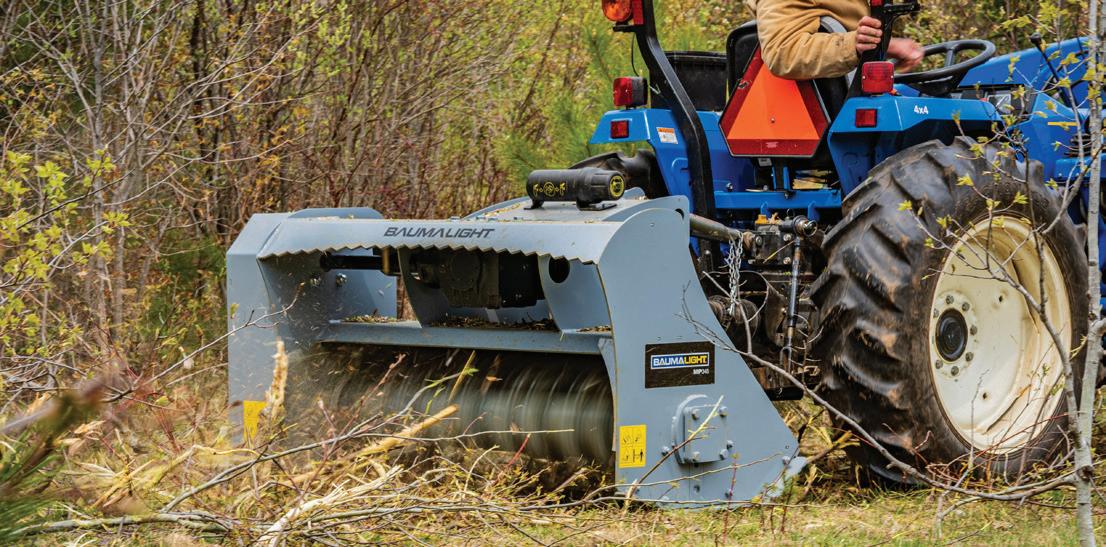FRONT PORCH
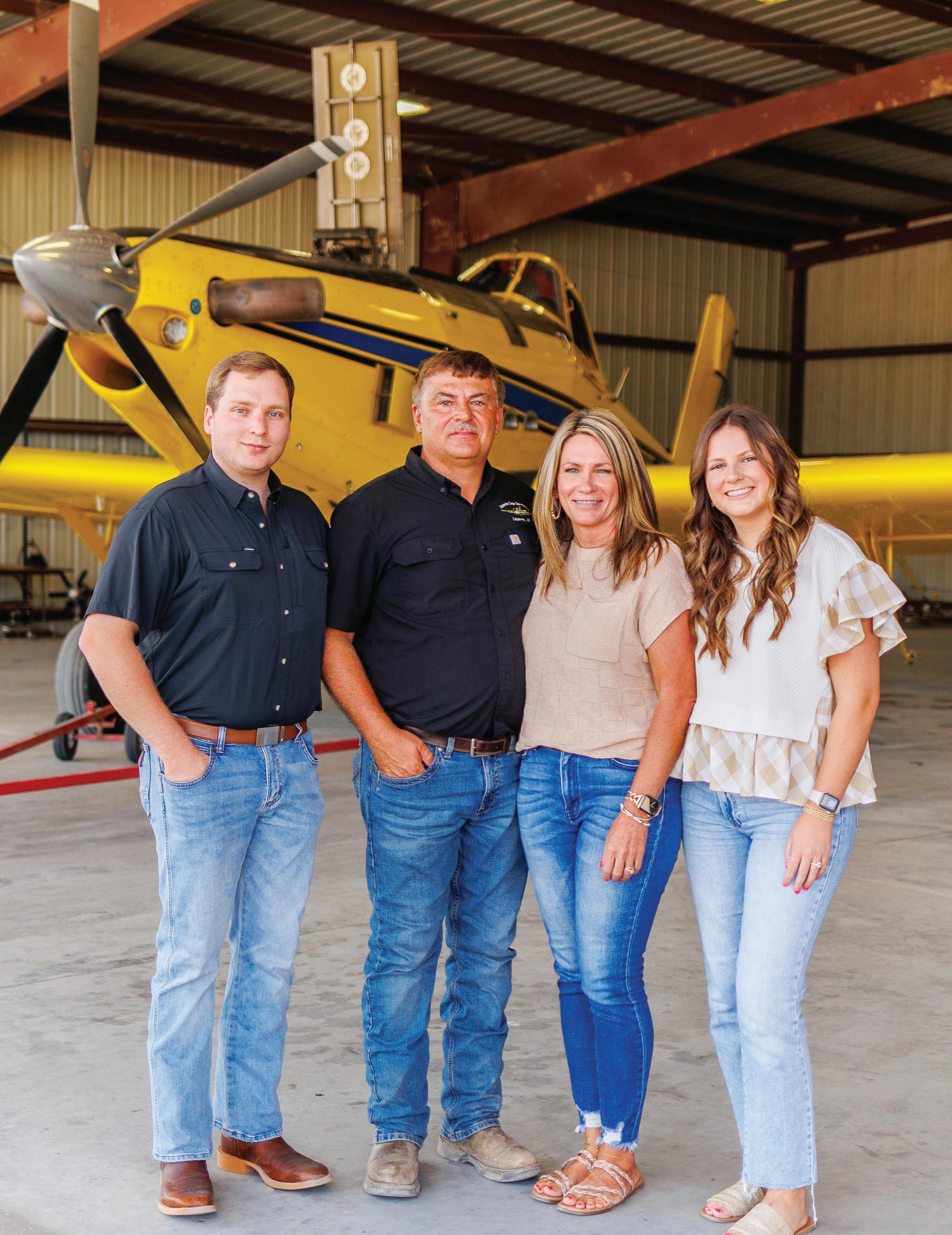


Rural Fire Chief Clint Bowen was destined to serve his communtiy
Nita Cooper leads from the inside out

with your

apply by July 1 at agfc.com/dmap
The Arkansas Game and Fish Commission’s Deer Management Assistance Program (DMAP) helps landowners manage deer and deer habitat on their land. With dedicated deer biologists on staff, landowners and landowner cooperatives managing at least 500 acres now have more resources to improve their deer herd than ever before. Become a DMAP participant and receive one-on-one guidance to achieve your conservation goals. Enrollment is free and does not affect land access policies. To inquire, scan the code or visit www.agfc.com/DMAP to find your region’s DMAP biologist. Applications close July 1.

5 / My View From the Front Porch
Dan Wright
7 / Serving Farmers, Serving You
Jarrod Yates
8 / Cover Story: From Flying to Farming
Henderson family accolades started with a passion for flying planes
16 / Women's Leadership Committee's New Chair
Nita Cooper leads the next generation from the inside out
24 / A Day in the Life of a Rural Fireman
Clint Bowen puts the community first in Pea Ridge
30 / A View From the Counties
Outreach and education across Arkansas
38 / Taste Arkansas
Farm-fresh ice cream from Arkansas Farm Trail participant Sara Beth Johnson of Flying Pig Cattle Co.
41 / Delta Child
Talya Tate Boerner
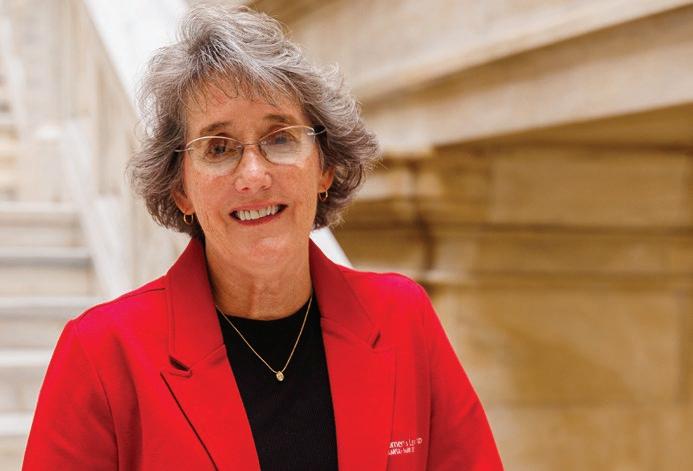

On the cover: The Henderson family, (from left) Bryce, Murry, Dee and Macy, are emblematic of the work ethic and ingenuity of farm families that make up Arkansas’s largest industry. Read more about the 2024 Arkansas Farm Family of the Year, beginning on page 8.
By DAN WRIGHT ARKANSAS FARM BUREAU PRESIDENT
During a recent road trip, I was flipping through radio stations when I heard a song about writing a letter to your younger self. It was one of those slow, reflective songs that catches you off guard. I kept listening. The closer I listened, the more I started to think about what I would say if I’d had the chance to write that letter – to go back in time and talk to the younger version of myself when I was just starting out in farming and ranching.
It was a long road trip, so I had time for my mind to wander. Would I warn myself about some of the mistakes I’ve made over my life? Or would I focus on the things that turned out better than I ever expected?
There are definitely a few things I would want my younger self to know about the farm. First, I’d say this: There are going to be some tough times. Really tough. You’re going to face droughts, floods, equipment breakdowns and markets that turn against you overnight. There will be moments when you wonder how you’re going to pay the bills or whether you need to find an extra job. You’ll lie awake at night, staring at the ceiling, going over the same numbers again and again.
But I’d also tell you this: You will make it. Not because luck always swings your way – because it won’t. You’ll make it because you’re stubborn in the right ways. You’ll refuse to quit. You’ll put in the hours, work through the setbacks and keep pushing forward because you’ve always been more afraid of failing than tired of trying.
That fear of failure is not always a bad thing. It will drive you. You’ll treat every financial decision like it is life or death. You’ll run numbers into the ground, staying up half the night with a pencil and a calculator, convincing yourself that something is either a risk worth taking – or not worth touching with a 10foot pole. And sometimes, despite all that planning, you’ll still get it wrong. But often, you’ll make the right choice.
I’d also tell you that you’re not alone in feeling that way. Every farmer, every rancher, has those worries. The pressure to make the right call – to keep things going not just for yourself, but for your family, your employees and your legacy – is a heavy load. And no one really teaches you how to carry it. You just learn by doing. You get stronger because you must.
And here’s something I really wish you’d take to heart: Worry about what you can control – and let go of what you can’t. You’ll burn yourself out trying to make sense of things that are out of your hands. Worrying about whether a Farm Bill will get passed through Congress this year, how bad the weather will be and the impact of political games will drive you absolutely nuts. You didn’t create those difficulties, but you will have a chance to make things better. Be patient.
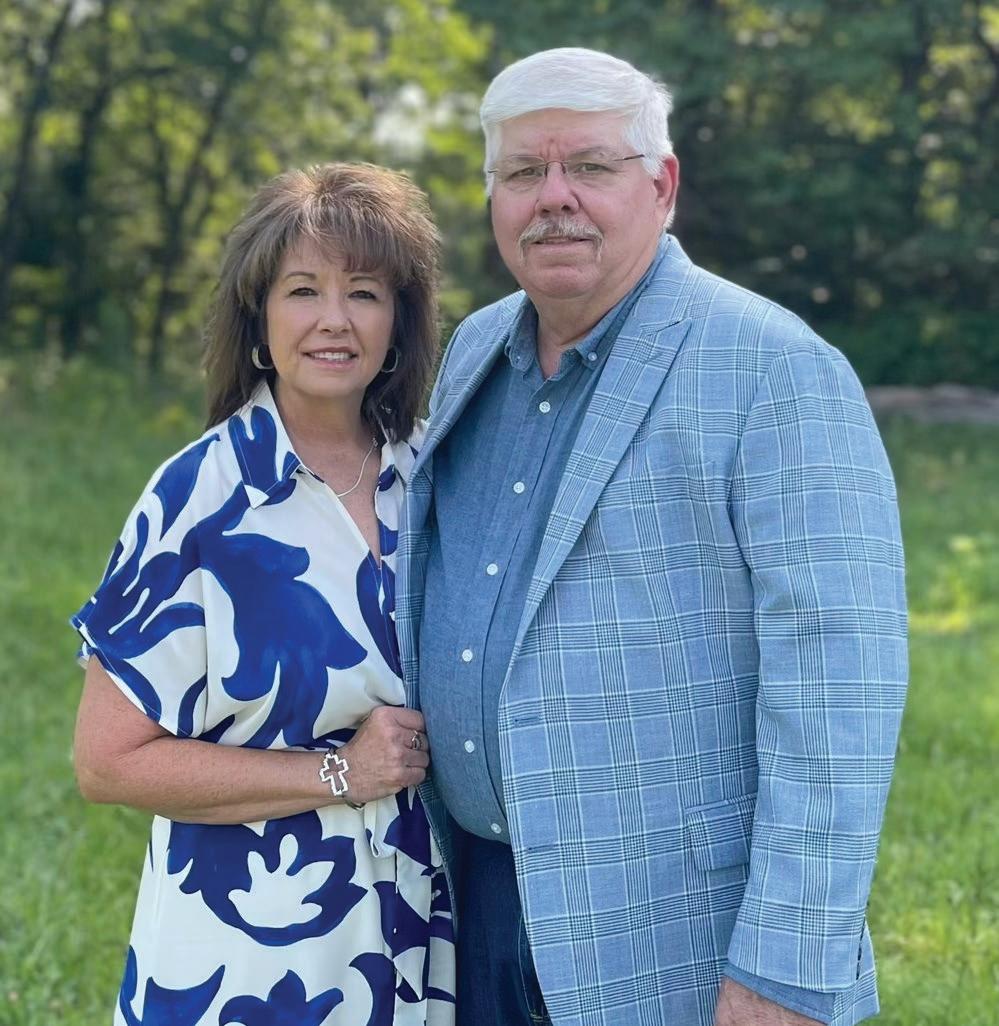
Don’t let bitterness sink in. Focus on what you can do –on your family, land, animals, employees and your whole operation. That’s where you can make a difference. And when you start to feel the frustration rising, take a minute and think about the good things. Think about your family. The ones who sit at your kitchen table every night. The ones who ride in the truck with you, who help fix fences, who grow up learning how to work with their hands and their hearts. That’s the real reward. That’s what keeps it all worthwhile.
I’d remind you, too, that not every good thing shows up on a balance sheet. Some of the best moments in your life will be quiet and simple: watching your kids play in a hayfield, hearing laughter around a dinner table after a long day, catching a sunrise before the rest of the world is even awake. These are among the blessings God has given you. Cherish them.
And, finally, I’d say this: Keep going. Keep doing what you’re doing. Even when it’s hard. Even when it feels like no one notices. Because one day you’ll be on a road trip, thinking about that younger version of yourself – and you’ll realize you’ve built a life that matters.
A life of work, yes – but also of purpose. A life rooted in land, effort and grit. A life built on the foundation of God, and a life surrounded by people who love you.
What would you write to your younger self?
God bless.
Official
SUBSCRIPTIONS
Included in membership dues
ARKANSAS FARM BUREAU OFFICERS:
President / Dan Wright, Waldron
Vice President / Mike Freeze, Little Rock
Secretary/Treasurer / Terry Dabbs, Stuttgart
Executive Vice President / Jarrod Yates, Benton
DIRECTORS:
Magen Allen, Bismarck
Jon Carroll, Moro
Brad Doyle, Weiner
Jack Evans, Carlisle
Sherry Felts, Joiner
Chase Groves, Garland City
Jason Henson, Mount Judea
Terry Laster, Strong
Caleb Plyler, Hope
Bob Shofner, Centerton
Dana Stewart, Judsonia
Joe Thrash, Houston
Mark Williams, Lavaca
Nita Cooper, Everton
Sara Beth Johnson, Hickory Plains
Justin Story, Cauthron
Stewart Warner, West Memphis
Executive Editor / Steve Eddington
Contributing Writers / Shaylee Wallace Barber, Matthew Magdefrau, Justin Rotton, Tayla Tate Boerner
ADVERTISING
Contact Chad Hooten at Arkansas Farm Bureau for advertising rates chad.hooten@arfb.com (501) 228-1274
Front Porch (USPS 019-879) is published quarterly by the Arkansas Farm Bureau Federation
10720 Kanis Rd., Little Rock, AR 72211
Periodicals Postage paid at Little Rock, AR
POSTMASTER: Send address changes to Rhonda Whitley at rhonda.whitley@arfb.com
Front Porch • P.O. Box 31 • Little Rock, AR 72203
Please provide membership number Issue #135
Publisher assumes no responsibility for any errors or omissions. All rights reserved. Reproduction without permission is prohibited.
The Arkansas Farm Bureau Federation reserves the right to accept or reject all advertising requests.






By JARROD W. YATES
ARKANSAS FARM BUREAU EXECUTIVE VICE PRESIDENT
It feels like someone is always asking us for something these days. Whether it’s a phone call from an unfamiliar number, an unexpected email or a scam telling you there’s an outstanding toll-road fine to be paid. It’s understandable that most of us are a little skeptical when someone asks us to join something or asks us for money.
That’s why I want to take a moment to tell you how this message is different. If you’re not currently a member of Arkansas Farm Bureau, I’d like to personally ask you to consider joining us. And I promise – it’s worth hearing me out.
When many people hear Farm Bureau, their first thought is probably insurance. That’s fair. We have outstanding agents across Arkansas who provide highquality insurance products for homes, vehicles, farms and personal property. But the Farm Bureau is far more than insurance. It’s a membership organization working every day to strengthen and support our communities, our way of life and Arkansas agriculture.
First, let’s talk about the basics. A Farm Bureau membership in Arkansas costs just $40 per year. For that fee, you not only support advocacy efforts that protect rural Arkansas, but you also unlock a wide range of member benefits. I’ve included a QR code so you can easily explore the full list of membership benefits. Here are just a few of the discounts: savings on new Ford vehicles, farm equipment, deals on hotel rooms and rental cars, discounted tickets to Silver Dollar City, reduced rates on Sam’s Club memberships, lower prices on propane and paint at Sherwin-Williams. The benefits often exceed the cost of the membership itself.
But even more valuable than the discounts is what your membership helps us do behind the scenes. When you join the Farm Bureau, you are standing up for the future of agriculture in Arkansas and for the communities that make this state special. You’re supporting efforts at the local, state and federal levels of government that protect our rural way of life. There are real threats to the things we often take for granted in rural Arkansas – our schools, roads and bridges, access to high-speed internet, property tax rates and utility bills. The Farm Bureau is working on these issues every day.
We advocate for sound policy that supports farmers and ranchers and their ability to feed and clothe the world. But we also fight for families who live in small towns. We believe rural Arkansas matters, and we make sure our elected officials know it.

If you know me, you know I’m not one to ask someone for anything lightly. I don’t enjoy asking for help, and I don’t ask people to buy into something unless I truly believe in it. But this is too important not to share. The truth is, there is strength in numbers and we need your voice.
We need people who care about Arkansas to stand with us. Whether you’re involved in agriculture, live in a rural town or simply want to make sure that the values we care about are represented in government and public policy, joining Farm Bureau is one small step that makes a big difference.
Join for a year. Just one. I think you’ll see the value immediately. And I believe you’ll keep that membership going for years – not just for the perks, but for the impact you’re making. Together, we can ensure Arkansas remains a place where agriculture thrives and rural families prosper.
Please consider joining today, either at your local Farm Bureau office or through the included QR code. I also invite you to follow us on social media and get involved in your county Farm Bureau. We would love to meet you, hear your ideas and work side by side with you to keep Arkansas strong.
Together, let’s make a difference.
Story and Photos by MATTHEW MAGDEFRAU
Murry Henderson Jr. has always had his head in the clouds. While other children might dream of becoming professional athletes, firefighters or doctors, Henderson knew from an early age he wanted to be an agricultural pilot, an interest stoked by the planes that flew over the Delta.
While it is not unusual for a young boy in the Delta to aspire to work in agriculture, Henderson’s ambition was unique — his family neither farmed nor flew planes. Without that foundation, his dream seemed improbable.
Almost 30 years later, Henderson operates Lepanto Crop Service, which serves between 40 and 50 farms in Poinsett, Mississippi, and surrounding counties in northeast Arkansas. In addition to his aerial application business, Henderson farms approximately 4,200 acres of cotton, corn, rice and soybeans.
The Hendersons were honored in December as the 2024 Arkansas Farm Family of the Year, a headline for the story of one family’s success through faith, farming and living out their own version of the American dream.

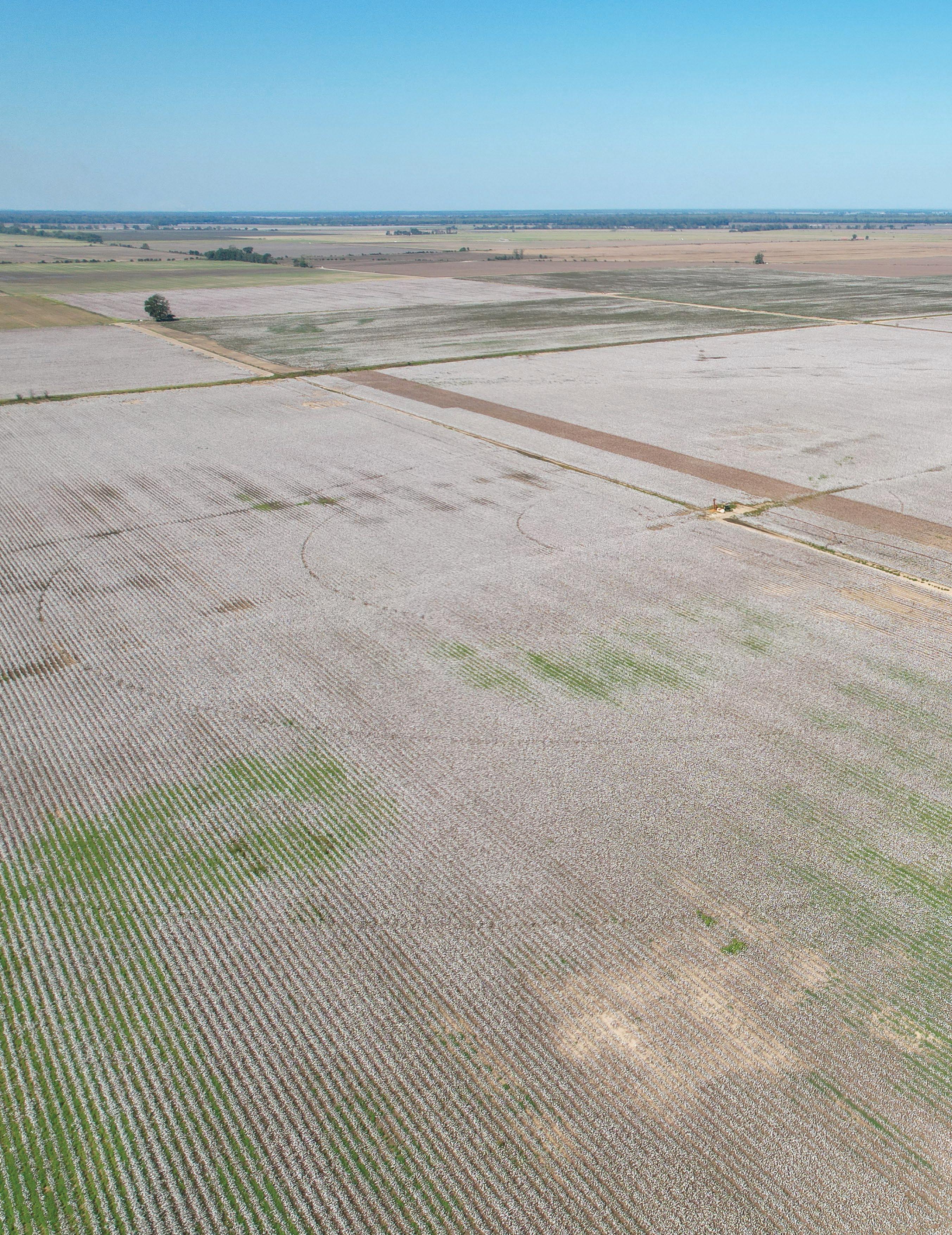
Murry and Dee Henderson were named the 2024 Arkansas Farm Family of the Year. Judges were impressed with their diversified efforts, with an ag aviation company that services several farms in northeast Arkansas, as well as the 4,200 acres of cotton, corn, rice and soybeans they grow.


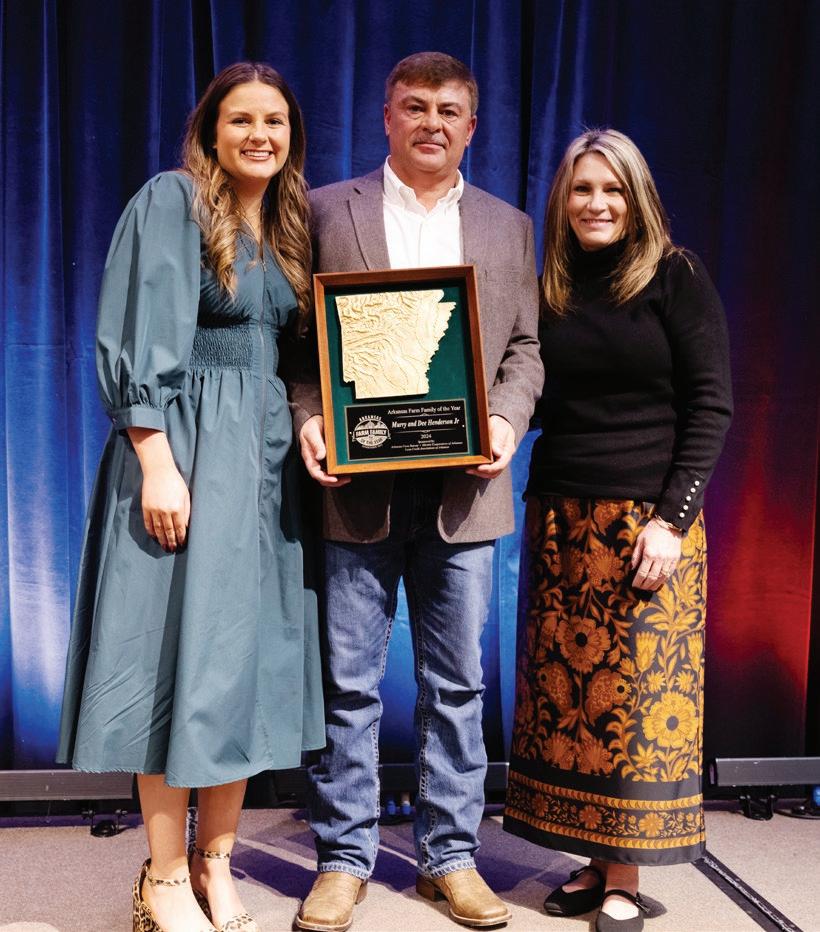
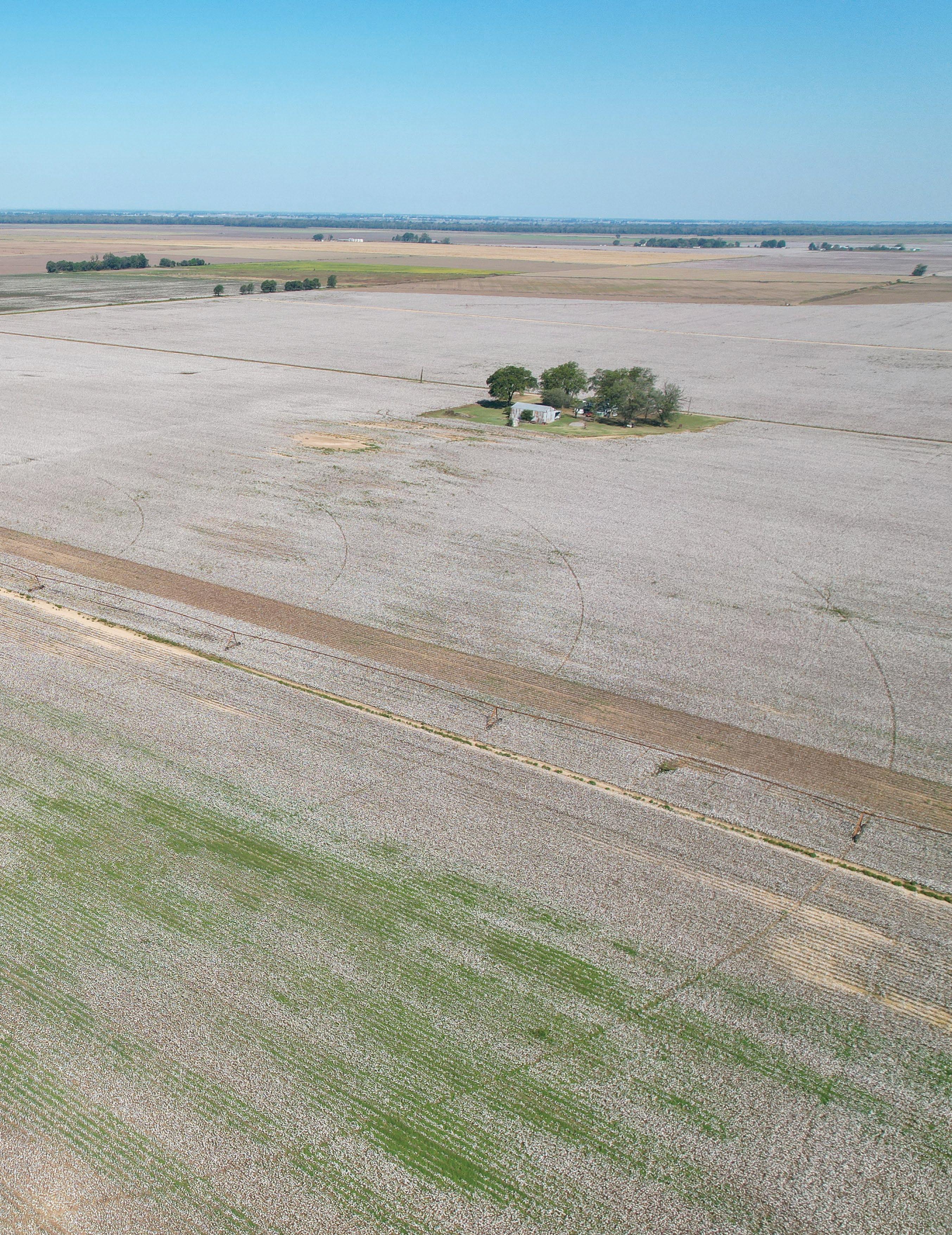
HENDERSON’S path did not lead directly to aviation. Upon graduating high school, he had the opportunity to attend college and pursue a degree, setting himself up for a traditional career. However, the desire to sit in the seat of an airplane never faded.
“I guess it was just in my blood,” he said.
Unable to ignore his passion, he made a bold decision. While sitting in class, daydreaming about flying, Henderson chose to leave college. The next day, he enrolled in flight school.
“My parents were less than pleased with this decision. It wasn’t good around the house for a while,” he admitted.
Determined to fund his dream, Henderson took a job at a local factory.
“I would fly during the day, working toward my license, and then clock in at the factory at night.”
For two years, Henderson balanced flight school and factory work until he earned his commercial and agricultural pilot’s licenses. From there, he transitioned into full-time agricultural aviation after landing a job with Lepanto Crop Services.
Though initially hesitant, his parents eventually came to support his career choice wholeheartedly. Their support grew so strong that when his father, Murry Sr., retired in 2010, he wasted no time joining his son’s business.
“He retired from his job on a Friday, and on Monday morning he showed up at my place ready to get to work,” Henderson recalled.
His father had only one condition: He starts at 8 a.m. and is home by 4 p.m. To this day, Murry Sr. remains an integral part of the operation. The Henderson men share a hearty work ethic.
While this might seem like the perfect conclusion to Henderson’s story, he was far from settling. In 2001, he and his uncle, the late Winston Bowman, had the opportunity to rent an airstrip in West Ridge — a key step toward operating his own agricultural service company. However, the rental agreement came with an unusual stipulation: He was required to farm the 100 acres surrounding the airstrip.
THIS REQUIREMENT posed a significant challenge for Henderson and his wife, Dee. By this time, he was experienced in agricultural aviation but had no background in farming. Fortunately, his friend Ron Holthouse provided encouragement and hands-on support.
Holthouse assured Henderson he could farm successfully, offering guidance and even lending equipment.
Henderson figured being a farmer would only help build trust with his clients of the crop service business.
Before long, he was not only piloting aerial applicators but also farming in the Mississippi River Delta. Being a first-generation farmer can be difficult. Someone who embraces that role must be willing to take on significant risk, everything from equipment costs to land needs and labor.
Within five years, Henderson secured additional rental agreements with local landowners Travis Senter and J.C. Portis Land Co., expanding




HENDERSON AND HIS UNCLE, THE LATE WINSTON BOWMAN, HAD THE OPPORTUNITY IN 2001 TO RENT AN AIRSTRIP IN WEST RIDGE – A KEY STEP TOWARD OPERATING HIS OWN AGRICULTURAL SERVICE COMPANY. HOWEVER, THE RENTAL AGREEMENT CAME WITH AN UNUSUAL STIPULATION: HE WAS REQUIRED TO FARM THE 100 ACRES SURROUNDING THE AIRSTRIP.
the Henderson’s farming operation to nearly 700 acres by 2005. Henderson attributes much of his success to these connections: “Being a first-generation farmer, it’s hard for landowners to turn you loose on something critical without knowing if you will succeed. People stepping out, giving me a chance to prove myself is what made all the difference early on.”
From there, steady growth became the goal, and they have slowly and steadily increased their acreage.
The labor issue has always remained but Murry and Dee both agree they have had their fair share of great employees over the years. Reggie Horton and Barry Blake were names mentioned several times among the helping hands that quickly became like family for the Hendersons. Labor today remains an issue, and since 2022 Henderson has employed some H2A laborers.
DEE GREW UP on a small farm in Crittenden County, where she was exposed to the farming way of life. She was a labor and delivery nurse when she met Murry. After they married and started a family, she found herself missing important moments, such as tee-ball games and family time, due to her nursing schedule.
As the Hendersons’ agricultural service business expanded alongside their farming operation, it became evident that someone needed to oversee the logistics of both ventures. In 2003, Dee took on that role, diving headfirst into managing the business. Today, she handles everything from mapping out fields and directing pilots to managing payroll. She is a cornerstone of the operation.
“She does it all, and she’s been by my side all the way,” Henderson said.
“It's a lot of chaos,” Dee laughs. “I deal with our farmers every single day. It’s gotten to the point where farmers call me before Murry. At this point I know more names of fields than Murry does.”
“She also writes a little neater than I do,” Murry said. “Jokes aside, I couldn’t ask for a better partner.”
The flying business continued to grow alongside the farm. As Henderson built relationships with farmers, they exchanged knowledge. By working with farmers from multiple generations, he gained wisdom from experienced growers while staying current with new agricultural technology introduced by younger farmers.
In 2012, Murry and Dee acquired full ownership of Lepanto Crop Service, the company where Henderson began flying. They now operate two planes full-time, with Henderson being one of two full-time agricultural pilots.
BOTH DEE AND MURRY’S active engagement in farming meant their children, Bryce and Macy, grew up immersed in the operation. “We had packand-plays in the office, and our farmers would come in and pick the kids up and bounce them on their leg while they would book work,” Dee and Murry laughed.
Bryce followed in his dad’s piloting footsteps, graduating from Delta State University with a degree in commercial aviation. He now flies for Republic






Airlines. Meanwhile, Macy is completing a nursing degree at Arkansas State University, following in Dee’s initial career path before she transitioned to farming.
Bryce still enjoys visiting the farm on his days off, helping with fieldwork and getting seat time on the tractor. Macy’s fiancé is working toward his agricultural pilot’s license, potentially becoming the next generation of the flying service.
“It fills me with pride seeing what they’ve already accomplished, whether they want to come back and farm or not. They’re hardworking and don’t think they’re better than anyone else. I am very, very proud of my kids,” Henderson exclaimed, with a lump visible in his throat.
SUCCESS IS DIFFICULT to quantify. The Hendersons have received numerous accolades, with their recent recognition as Arkansas Farm Family of the Year being the latest acknowledgment of their hard work.
However, if one was to ask Murry or Dee what defines their success, they would not focus on personal achievements. Instead, they would credit those who helped them along the way — their family, employees, customers and community — and how they pass that help forward by always being willing to help others.
An example of this that hits close to home for Henderson is when his brother lost his job at the Memphis airport after being unwilling to relocate around 2010. Henderson helped him get started in farming, much like Holthouse did several years earlier.
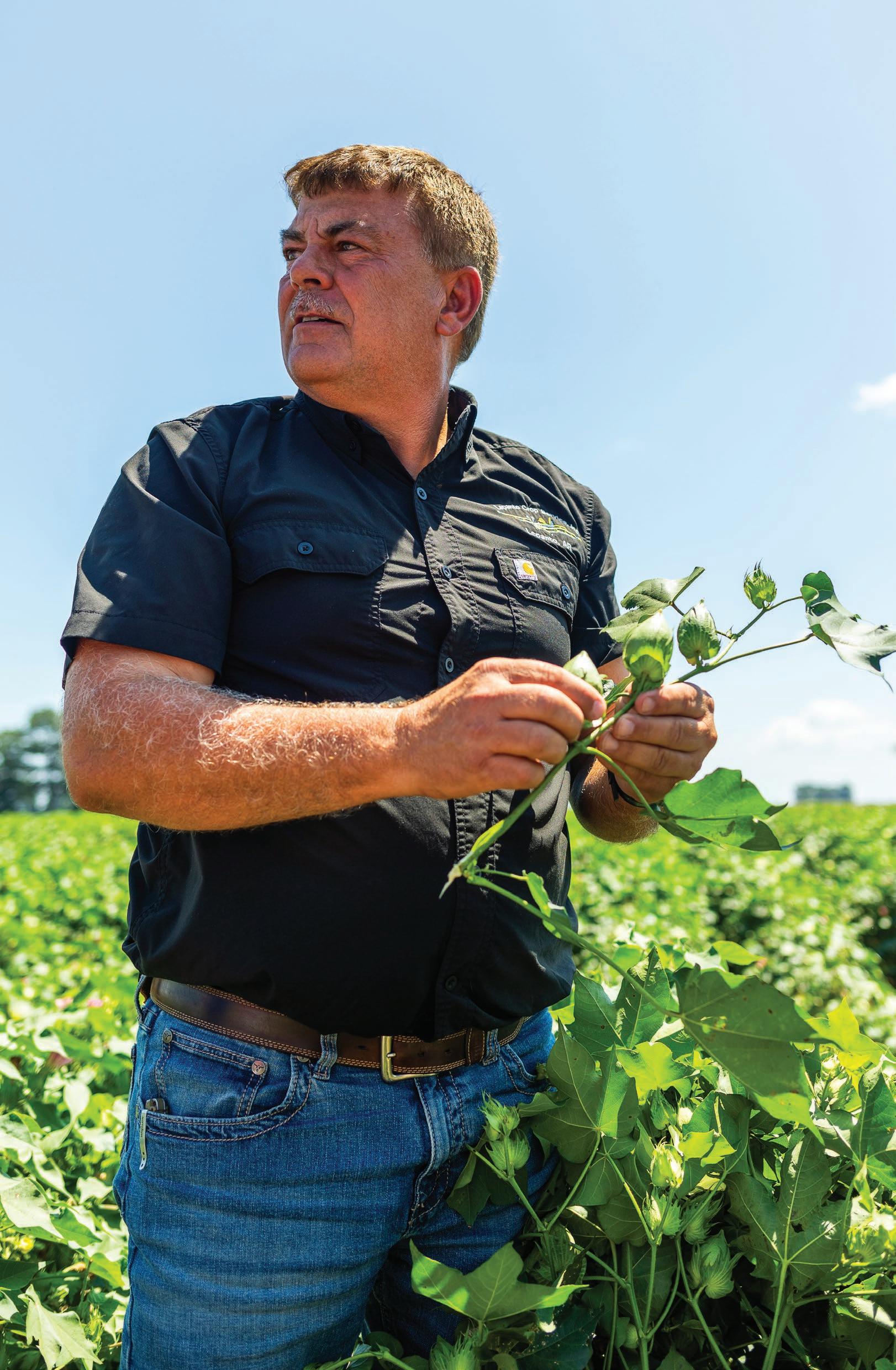
His brother now farms around 3,800 acres and has a son who is gearing up to be the next generation on that operation.
“You don’t get ahead by going at it alone,” Henderson said. Whether referring to employees, customers or even a stranger arriving at his farm to take photos for the Farm Family of the Year program, Henderson and his family treat everyone with respect and kindness — this is the Henderson motto.
For Henderson, gratitude remains at the heart of his journey.
“The good Lord blessed us,” he continued. “A lot of people consider farming a gamble every year; however, if you love what you do, it’s not a gamble.
“People tell me I work too much with flying and farming, but I love it, so they couldn’t be further from the truth.”

By STEVE EDDINGTON
Photos By MATTHEW MAGDEFRAU
Standing at the kitchen window of her family farm in Everton (Boone County), Nita Cooper sees more than pastureland and cattle. She sees generations of heritage, a life molded by seasons and soil, and the responsibilities of a leader deeply rooted in rural values.
“I’m looking out my window at Boat Mountain,” she said in a cheerful, assuring voice, describing a familiar scene that’s as much a part of her as her name.
“The grass is green. We’ve got a young first-calf heifer out there – we had to help her a bit. But you know how it is with heifers. Sometimes they just need a little guidance.”
A blend of care, knowledge and community involvement defines Cooper not only as a farmer but as a leader. Now serving as chair of the Arkansas Farm Bureau Women’s Leadership Committee, she brings over three decades of experience in agriculture, extension work and community building to the role.
And for Cooper, it all starts at home – on the family farm, with her family by her side, and with a commitment to impacting others.
“For me, leadership is trying to help others succeed,” she said. “Trying to improve your little corner of the world, which not only improves your little corner of the world, but helps your state, helps our nation – helping others, serving others.”
Nita and her husband Gary, a fourth-generation farmer, run a cow-calf operation. Their daughters, Nikki and Kim, each live within 20 minutes of the family farm with their own families. Nikki, a middle school teacher,


and Kim, who works for the Farm Service Agency, grew up alongside cattle, tractors and the rhythms of farm life. Their husbands each work in an ag-related business. Nita and Gary are very involved with their five grandchildren, who she said are old enough now to help out on the farm, making it a true multigenerational operation.
“Isn’t that fun?” Nita said. “It’s something special to watch your grandkids out helping. The sixth generation is here.”
Born and raised in Horatio (Sevier County), Cooper grew up in a family that valued hard work and rural life. After high school graduation, she attended the University of Arkansas in Fayetteville.
Her deep appreciation for rural life is matched only by her sense of responsibility to serve and uplift others.
Cooper began her professional journey in 1988 as a county extension agent with the University of Arkansas Extension Service. Starting in Faulkner County and later transferring to Boone County, she devoted over 30 years to 4-H and family and consumer science programs.
“I like to say the folks in Faulkner County finished raising me,” she joked. “When you’re just out of college, you can be a little green. But those early years shaped me.”
She speaks of her time with Extension as the foundation of her leadership philosophy: “Whether it’s working with youth or adults, it takes everyone – volunteers, community members, leaders – to build and maintain a strong program. That’s what I learned early on, and I still believe it.”
It was through her work with Extension that Cooper first became involved with Farm Bureau, attending women’s conferences and learning about the organization’s broader mission beyond insurance.
“When people hear Farm Bureau, they think of insurance first. And yes, I’m glad we offer that product –
“WHETHER IT’S WORKING WITH YOUTH OR ADULTS, IT TAKES EVERYONE — VOLUNTEERS, COMMUNITY MEMBERS, LEADERS — TO BUILD AND MAINTAIN A STRONG PROGRAM. THAT’S WHAT I LEARNED EARLY ON, AND I STILL BELIEVE IT.”
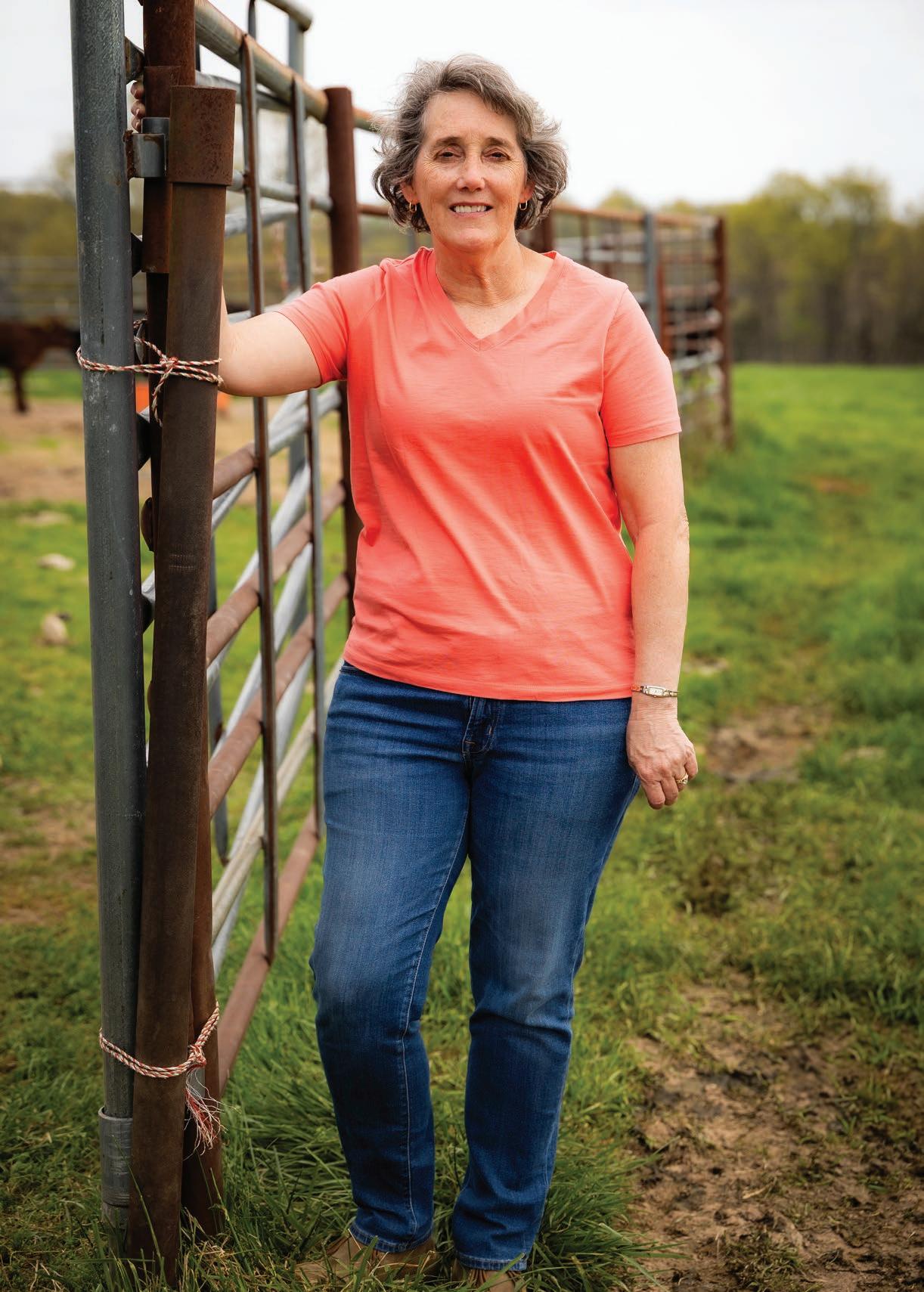
it’s important. But it’s so much more than that,” she said. In 2020, just a year after retiring from Extension, Cooper was asked to join the Arkansas Farm Bureau Women’s Leadership Committee. She didn’t even have a full month off before Gary returned from a Boone County Farm Bureau board meeting to let her know she’d been added to the county Farm Bureau board.
“He claimed he had nothing to do with it,” she laughed. But Cooper didn’t hesitate. She knew the work ahead was meaningful.
“I think everyone needs to know what the Women’s Leadership Committee really does,” she said. “We advocate for agriculture, promote it to youth and adult groups and work on leadership development. But it’s also about giving back to our counties.”
She’s especially proud of the committee’s Community Cultivations program, which empowers local Farm Bureau chapters to address specific needs in their areas. From food insecurity to education and outreach, the program reflects a grassroots approach to solving real problems.
“It’s everything from Hunters Feeding the Hungry to school backpack programs,” Cooper explained. “If you care about youth in your community, if you want people to know where their food comes from, there’s a role for you in this work.” Leadership Spotlight
— Nita Cooper on her work in the University of Arkansas Extension Service

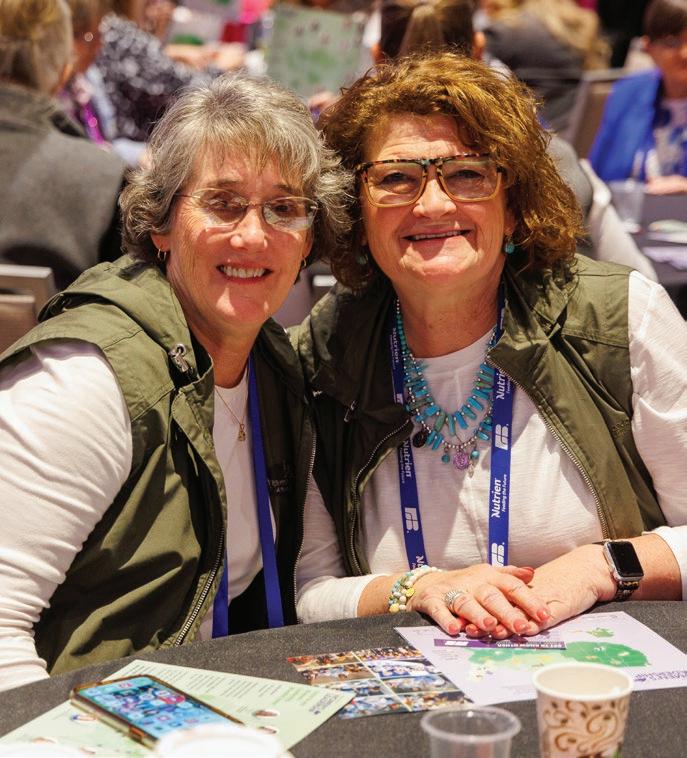

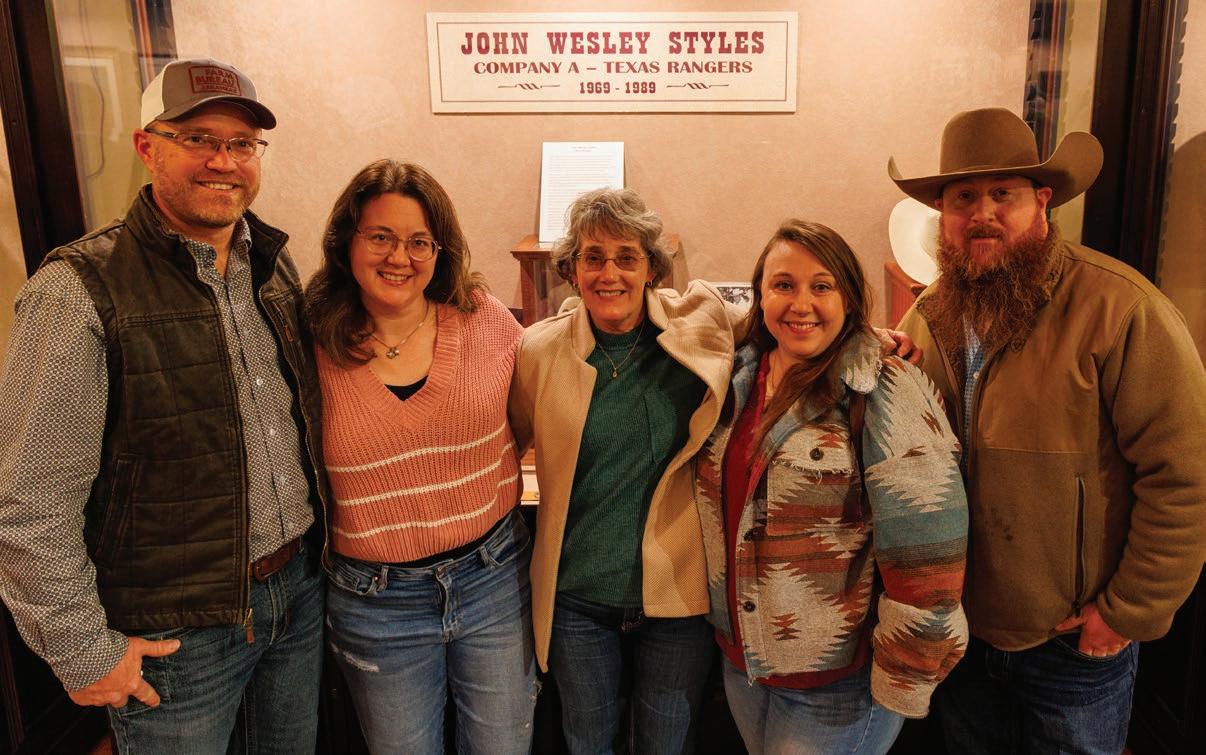
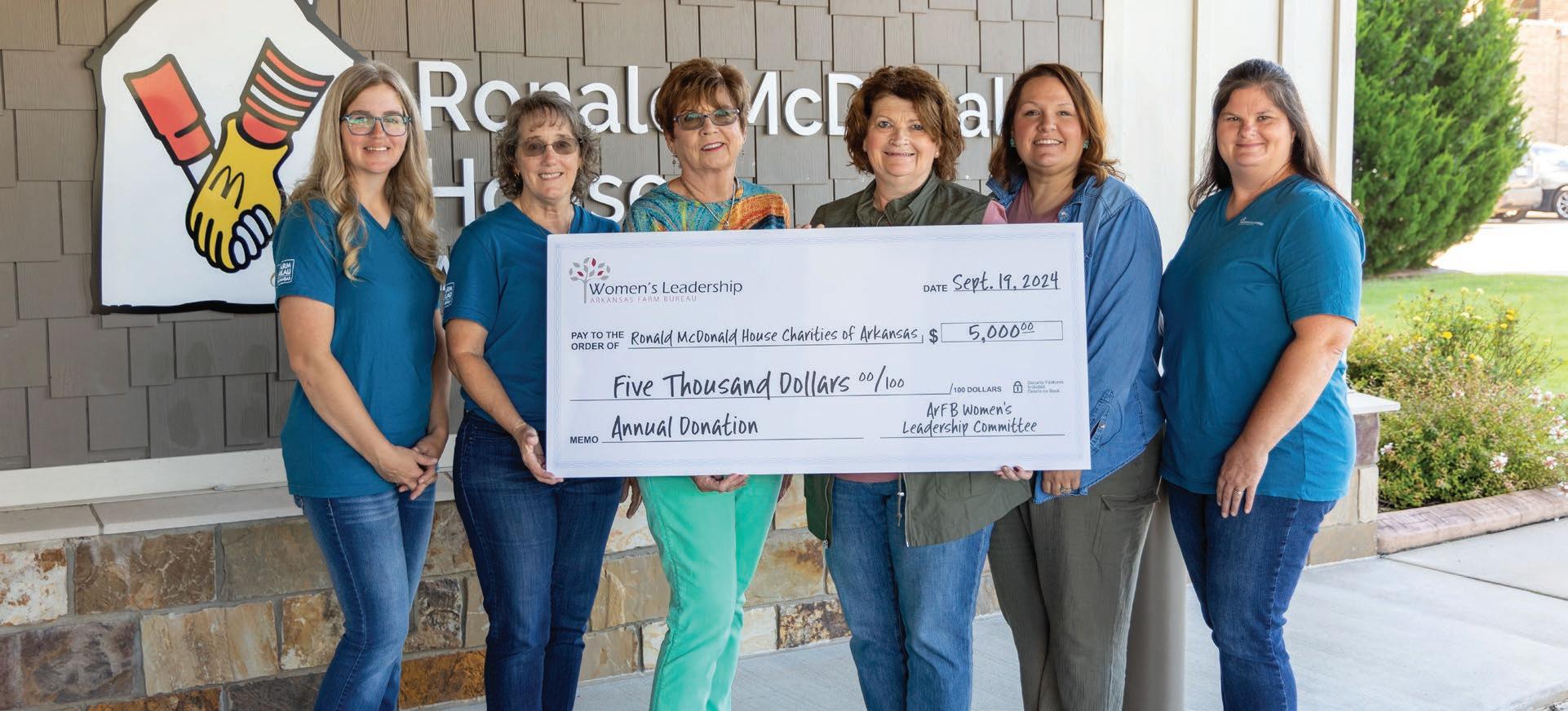
Her time on the state committee has also been eyeopening in another way: getting to see the diversity of Arkansas agriculture through the eyes of others. “Where I live, it’s mostly cattle and poultry. But through the committee, I’ve learned about cotton and peanuts and row crops that I never had much experience with. It’s amazing what’s happening in different corners of our state,” she said.
For Cooper, leadership isn’t about titles or visibility. It’s about service. That’s why she believes so strongly in the value of women’s leadership in agriculture.
“Women bring a different perspective. They’re community builders. They see the connections between people, between problems and solutions. And they get things done,” she said.
As chair of the Women’s Leadership Committee, Cooper is helping to shape the next generation of leaders. Whether it’s organizing educational events, advocating at the state capitol or supporting youth scholarships, she’s committed to strengthening the agricultural community from the inside out.
“We need people who are willing to serve,” she said. “And we need to show them that they belong in leadership. That they’re needed.”
Other members of the Women’s Leadership Committee are:
• Vice Chair Sara Beth Johnson, Hickory Plains
• Brittany Barnes, Jonesboro, District 1
• Pam Billingsley, Ash Flat, District 2
• Polly Lichti, Huntsville, District 3
• Elizabeth Walker, Horatio, District 4
• Abigail Meredith, Hot Springs, District 5
• Margie Raimondo, Little Rock, District 6
• Mindy Lockhart, Hope, District 7
Even after retiring from a 30-year Extension career, Cooper remains fully engaged in the work that matters most to her: farming, family and community. Her story is one of continuity – passing down values from one generation to the next, while always learning and growing herself.
“I’ve had a great experience,” she said. “Being on the committee, getting to know women from across the state, seeing the diversity of our agriculture – it’s been a blessing.”
And just like that young heifer learning how to care for her first calf, sometimes leadership is simply about showing up with a helping hand, a steady voice and the kind of wisdom that only comes from living close to the land.

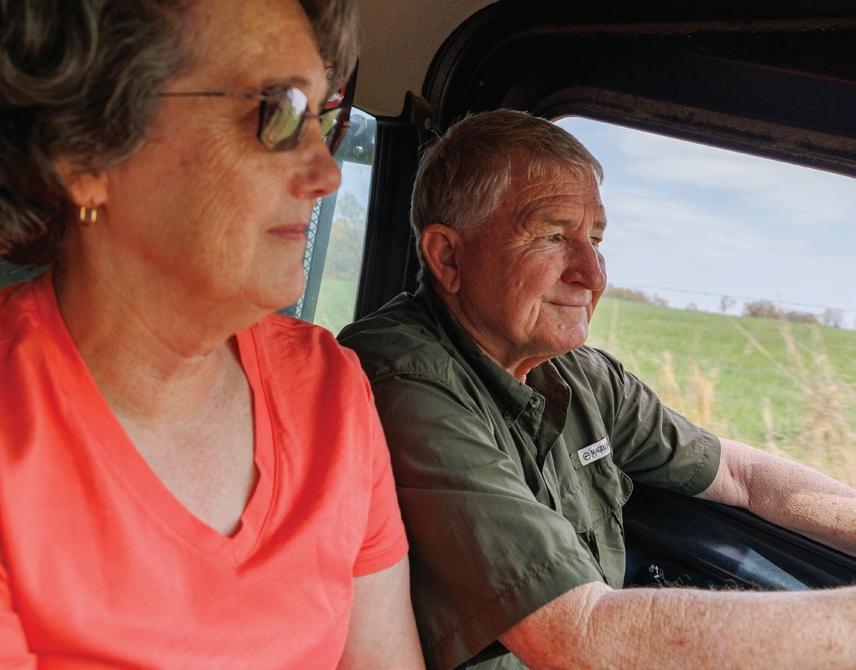
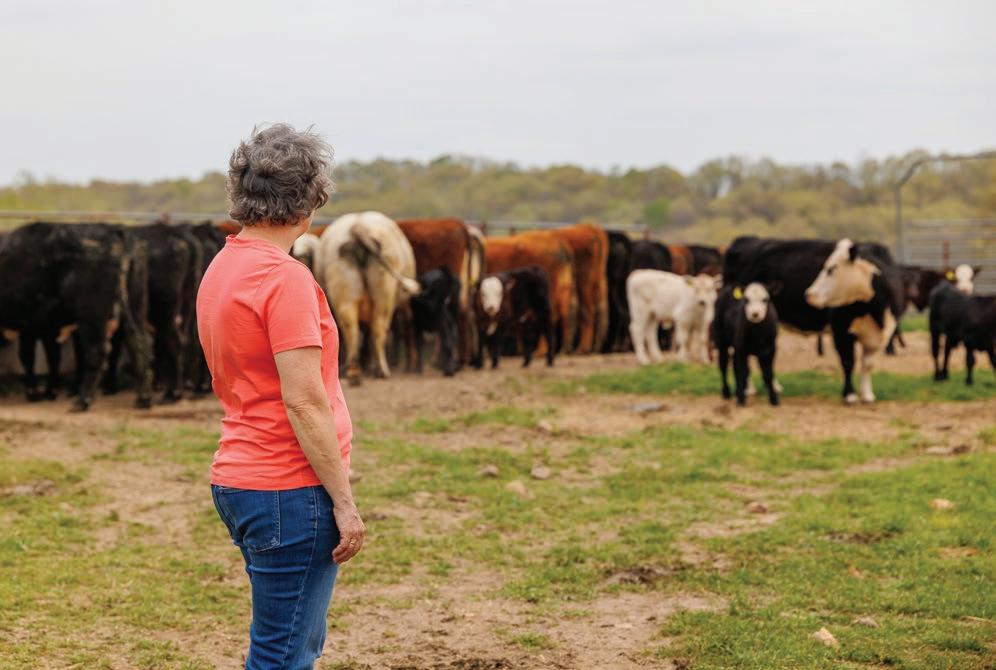

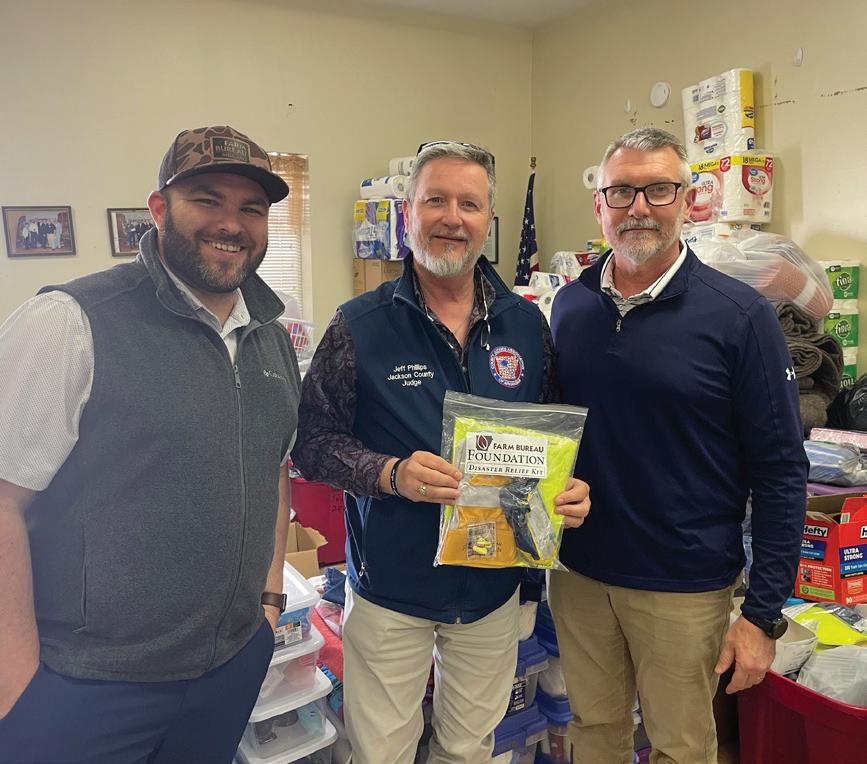


Arkansas Co.
Ashley Co.
Baxter Co.
Baxter Co. WLC
Benton Co.
Benton Co. WLC
Boone Co.
Bradley Co.
Calhoun Co.
Carroll Co.
Chicot Co.
Clark Co.
Clark Co. WLC
Clay Co.
Cleburne Co.
Cleveland Co.
Columbia Co.
Conway Co.
Craighead Co.
Crawford Co.
Crittenden Co.
Cross Co.
Dalllas Co.
Desha Co.
Drew Co.
Faulkner Co.
Franklin Co.
Fulton Co.
Garland Co.
Grant Co.
Greene Co.
Hempstead Co.
Hempstead Co.
WLC
Hot Spring Co.
Howard Co.
Independence Co.
Independence Co.
WLC
Izard Co.
Jackson Co.
Jefferson Co.
Johnson Co.
Lincoln Co.
Lincoln Co. WLC
Lincoln Co. YF&R
Little River Co.
Lonoke Co.
Madison Co.
Marion Co.
Miller Co.
Mississippi Co.
Monroe Co.
Newton Co.
North Logan Co.
Ouachita Co.
Perry Co.
Phillips Co.
Poinsett Co.
Polk Co.

Pope Co.
Prairie Co.
Prairie Co. WLC
Prairie Co. YF&R
Pulaski Co.
Randolph Co.
Saline Co.
Scott Co.
Searcy Co.
Sebastian Co.
Sevier Co.
Sharp Co.
St. Francis Co.
Stone Co.
Union Co.
Van Buren Co.
Washington Co.
White Co.
Woodruff Co.
Yell Co.

Magen Allen
Craig Allison
Trae Autrey
John Bailey
Jim Baker
Steve Barney
Tyler Bates
Britt Bauer
Daelynn Baughman
Phil Beall
John Michael &
Rachel Bearden
Traci Beene
Kalee Benson
Chris Billings
Leigh Blythe
Bobby Bowen
Clint Bowen
Frank Breedlove
Deborah Brennan
Randall Bullington
Reed Camp
Julie Campbell
Scott Carmody
Brandy Carroll
Jon & Jana Carroll
Jami Carter
Jeff Carter
Hank Chaney
Brian Clark
Curtis Clatworthy
Darrell Coker

Steve Cotten
Lori Covert
Will Cox
Jennifer Craig
Jannie Crow
Traci Crump
Brian Cunningham
Terry & Lori Dabbs
Jamie Daniel
Charles Denver
Heath & Melissa Donner
Brian Doyle
Denny Duran
Steve Eddington
Tim Edmondson
Bill Evans
Jack Evans
Wes Fairchild
Benton & Sherry Felts
Drew Flowers
Melanie Fosko
Danielle Francis
Amber Gifford
Mark & Dustina
Gordon
Billy Green
Bert Greenwalt
Cindy Ham
John Hanna
Ben Harper
101-Livestock
Advance Print Solutions
AgHeritage Farm Credit Services
Arkansas Department of Agriculture
Arkansas Electric Cooperative Corporation
Arkansas Foundation for Agriculture
Arkansas Pattern Masters
Arkansas State Chamber of Commerce
Arvest
B & R Farms
Bass and Bell
Big Branch-Cooper Cattle
Bismarck FFA Alumni
Caglesville Community Church
Catfish Farmers of Arkansas
Shelia Harrell
Flora Harrington
Maria Harvey
Lisa Hawley
Stan Hayes
Nick Heiser
Jason & Tana
Henson
Melvin Hicks
Jonathan Higgins
Steven Hignight
Stanley Hill
Susan Holman
Tony Hooper
Terry Horton
Bubba Hudson
Natalie Jaggars
Doug Jones
Jason Kaufman
Candice Kelso
Danette Kemp
Matt King
Michelle Kitchens
Terry & Wendi Laster
Matt Lister
Jeff Littlefield
Mindy Lockhart
Harold Logan
Wes Long
Mike Looper
Chris Loyd
Amy Lyman
DJ Mallard
Vincent Marchese
Melissa Marks
Blake Martin
Brandon & Lauren
Martin
Bo Mason
Jennifer Massanelli
Vince Massanelli
Marty McDaniel
Bobbi McDougal
Shane McElroy
James Mcghee
Kourtney McIntosh
John McKnight
Chad McRae
Lindsi Miles
Kirk Miller
Garrett Moix
Pete & Myra Moix
Cindy Moore
Reva Morrison
Will Nicholson
Megan O’Neal
Brittany Oakes
Jeff Parish
Mickey Parish
Cara Parker
Nathaniel Parker
Terry Parker
Doug Pettit
Richard Pierce
Brennan Pitard
Zachery Prothro
Scott Pryor
Robert Reid
Jimmy Reynolds
Justin Reynolds
Georgia Rhodes
Abbie Ribble
Judy Riley
Marty Riley
Ronnie & Kathy
Ritter
Elmer Robertson
Catrinia Rojas
Gerry Rouse
Theron Rowbotham
Lindsey Rowland
Cindy Rucker
Doug Russell
Joey Sample
Bill Shantz
Clayton Sharp
Katie Sharp
Bob Shoffner
Todd Smith
Joshua & Dana Stewart
Kerry Stiles
Shane Stolz
Justin & Laycee
Story
Scott Stuckey
Sam & Audrey
Tabler
Evan Teague
Crystal Thaxton
Jessica Vance
Jim Vereen
Chris Wade
Hannah Walker
Rusty Walker
Mack Wallace
Coe & Caleigh
Watlington
Jeremy Wesson
Rob Westerman
Richard & Lori
Whisnant
Suzanne White
Randy Wilhite
Amanda Williams
Justin & Aleisha
Willis
Brian Wilson
Madison Witcher
Karen Wood
Dan & Belinda
Wright
Robin Wright
Tom Wright
Jarrod Yates
Tommy & Amy
Young
Farm Bureau Bank
Farm Credit of Western Arkansas
Farmers Bank & Trust
FB Mutual of Ark- Bank Mktg
Feed Local
First Security Bank
Flywheel Energy
Fordyce School District
GNC Appraisals
Greenway Equipment
Hot Springs Advertising & Promotion
Joey Bailey Insurance Agency
Landmark
McLarty Auto Group
Natural State Consulting & Strategies
The mission of the Arkansas Farm Bureau Foundation is to further the understanding of agricultural and rural issues, and to support the agriculture and rural community through financial support for disaster relief, education, research and litigation.
Palestine Wheatley Booster Club
Pioneer Village
Precision Print Solutions
Prescott-Nevada County Chamber of Commerce
Price Grove Assembly of God
Progressive Tractor & Implement Co.
Richard & Lori Whisnant
Simmons Bank
Southern Farm Bureau Life Insurance Co.
Sunbelt Agricultural Exposition
Turn-Again Machine and Welding
Y E-H Club (Cleveland Co.)
In PHOTOS
Story and Photos by JUSTIN ROTTON
Atypical day for a rural fire chief is anything but routine. While many assume the role is mostly reactive — responding to emergency calls — Clint Bowen, fire chief of Pea Ridge, says otherwise.
“I don’t really know exactly what my day consists of because it’s just not the same every day,” Bowen said.
Bowen began his career as a volunteer with the Pea Ridge Fire Department in 1996 and has remained in Northwest Arkansas ever since. He credits 4-H for teaching him the importance of community service.
“It just always felt like I was helping somebody, and at the end of the day, I think that’s probably what I knew I wanted to do — just help people,” he said.
He starts his day early, checking in on his crew and identifying what they need to succeed. His responsibilities are broad, ranging from training and inspections to budgeting and planning for growth.
“Every new business or one that changes hands must have a full fire department inspection to get a certificate of occupancy — which is a big deal for a town this size,” he said.
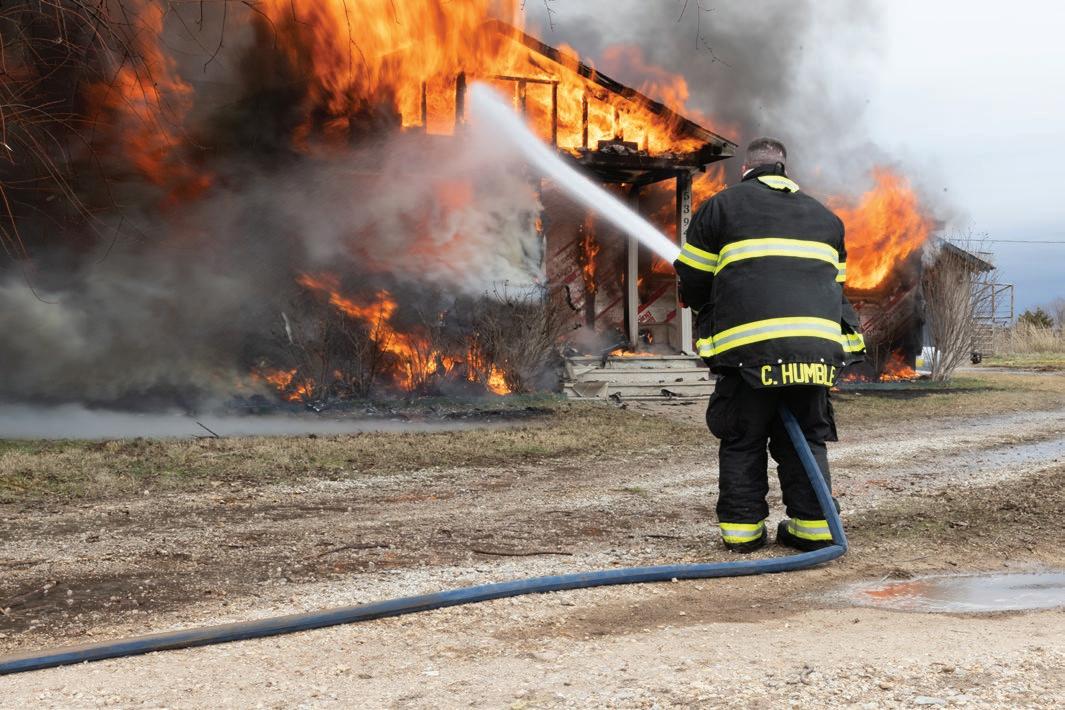

Pea Ridge Fire Chief Clint Bowen looks on while area fire departments use an abandoned house for training. “It puts them in realistic conditions where they must think, react and manage anxiety. That experience is invaluable.” (Insert) Training is essential in helping young firefighters learn how fires behave so they can safely and effectively extinguish fires.
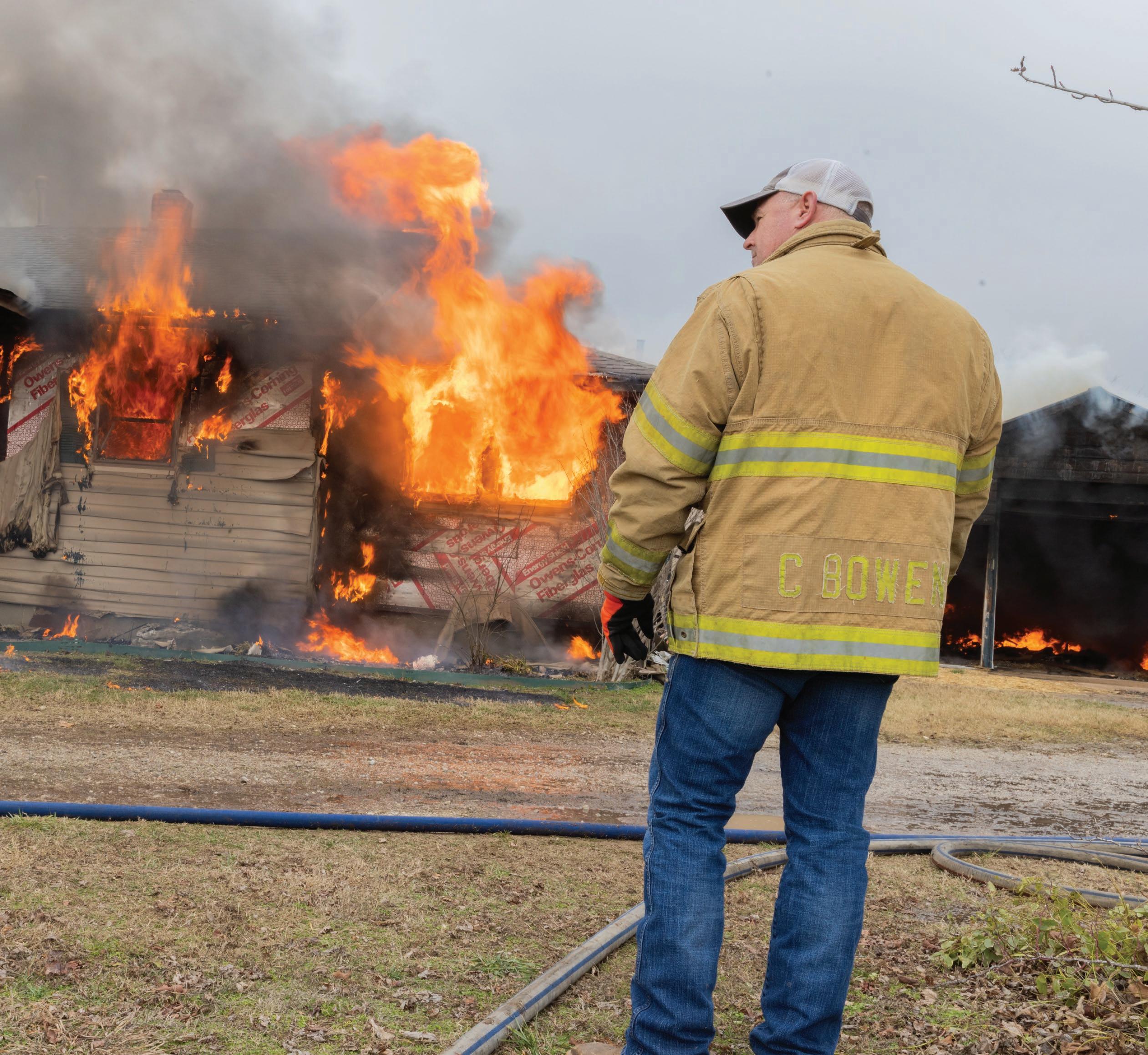

The role of a rural fire department chief involves many facets. (Above) Chief Bowen visits with his team as they train using masks and oxygen tanks to help ensure they maintain peak physical conditioning. Visiting his team each morning and dealing with the administrative side of firefighting is a part of Bowen’s daily routine: “I don’t really know what my day consists of because it’s just not the same every day.”

LIKE MANY DEPARTMENTS TODAY, Bowen must stay mindful of both present and future needs.
“You have to think not just about what you need, but how you’re going to afford it,” he said. “If I needed a fire truck today — and we do — you’re looking at a three-year build time. Fire engines are now pushing a million dollars. I used to get an ambulance for $200,000; now they’re just under $500,000.”
Training is a key part of his day-to-day work. A nationwide change in the reporting system has taken up much of his focus lately.
“It changes how all of our guys do reports and how we manage them. These are used to generate national statistics — fire-related fatalities, property damage and more,” Bowen said.

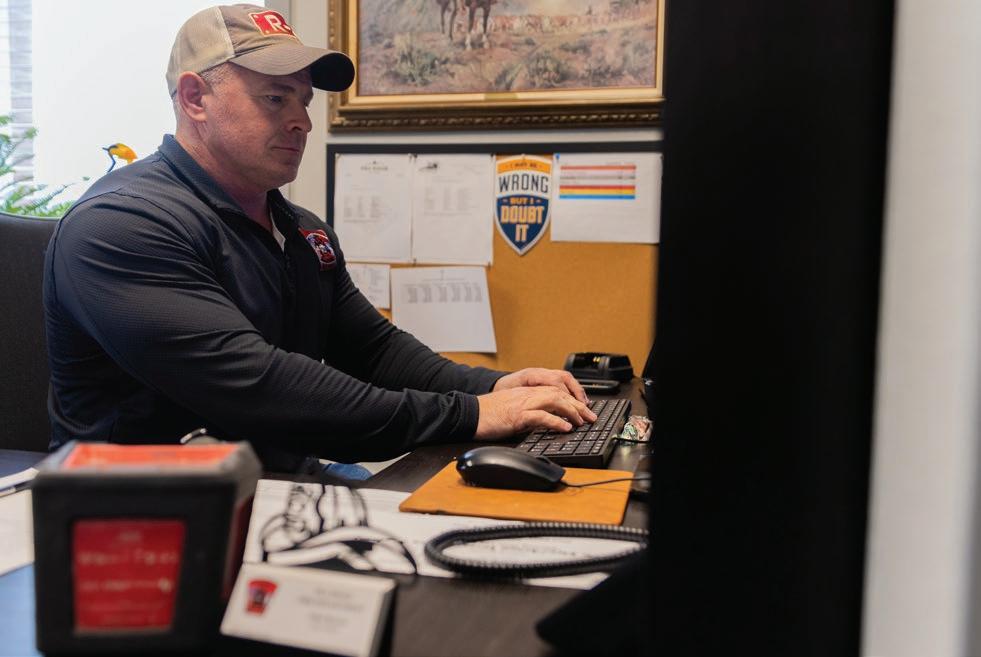
He also keeps a list of Insurance Services Office requirements posted near his desk. Meeting ISO standards not only improves fire department readiness but helps residents lower insurance rates. “This is our first year since I’ve been here that every shift has met that level of standards,” he said.
On the day we visited, Bowen was leading a multi-department training session, including several younger firefighters. He stressed the importance of live fire training: “It puts them in realistic conditions where they have to think, react and manage anxiety. That experience is invaluable.”
Physical readiness is another priority. Bowen implemented a mandatory fitness program requiring an hour of daily physical training. “People call us because they need something they can’t do themselves," he said. "We can’t show up in worse shape than the person who called us.”
Community involvement is also central to Bowen’s leadership. He regularly holds roundtable meetings with Pea Ridge’s mayor and residents to share updates and hear concerns. One major development: A new fire station is currently in the works.
Despite the city’s rapid growth, Bowen takes pride in keeping fire dues unchanged.
“Just because we’re booming doesn’t mean folks out in the rural parts of the county — who’ve owned their homes

for 50 years — are making more money,” he said. “We’re always mindful of the budget.”
Having served under several fire chiefs before stepping into the role, Bowen understands the importance of clear communication.
“When you’re upfront and honest with people, it sets you up for success down the road,” he said.
As a rural fire chief in a growing region, Bowen still reflects on the values 4-H instilled in him. “You meet someone who reminds you of your mom or grandma — you can do everything to treat them, but the best thing is just to hold their hand and let them know you’re doing everything you can for them,” he said. “Those are the folks I get the greatest satisfaction in serving.”

“IT JUST ALWAYS FELT LIKE I WAS HELPING SOMEBODY, AND AT THE END OF THE DAY, THAT'S PROBABLY WHAT I KNEW I WANTED TO DO — JUST HELP PEOPLE.”
—Clint Bowen, Pea Ridge Fire Chief






HERE IS A QUICK LOOK at some of the actions undertaken by county Farm Bureaus across Arkansas. Their work promoting agriculture in local communities is at the core of Arkansas Farm Bureau’s mission to 1) advocate the interests of agriculture in the public arena; 2) disseminate information concerning the value and importance of agriculture; and 3) provide products and services that improve the quality of life for its members.

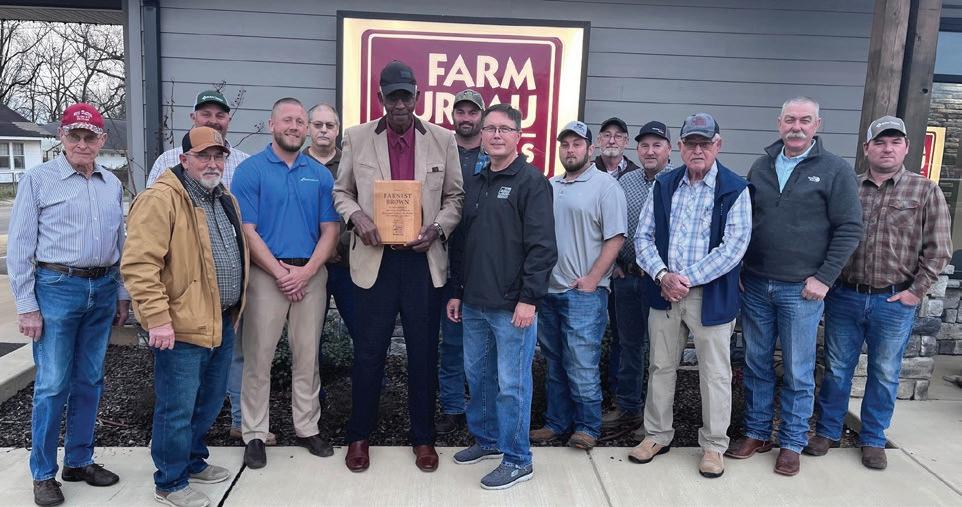
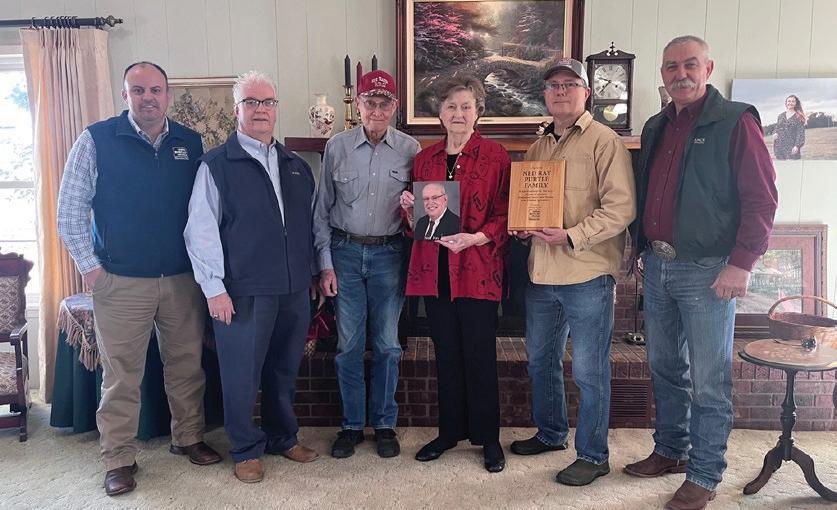
Hempstead County Farm Bureau board recently gathered to recognize three retirees from its board of directors. Ned Ray Purtle passed away prior to retiring with 48 years of service on the board. Glen Ford passed away a few months following retirement after contributing 46 years of service. Their plaques were accepted by their families. And Ernest Brown retired after serving 10 years on the board.
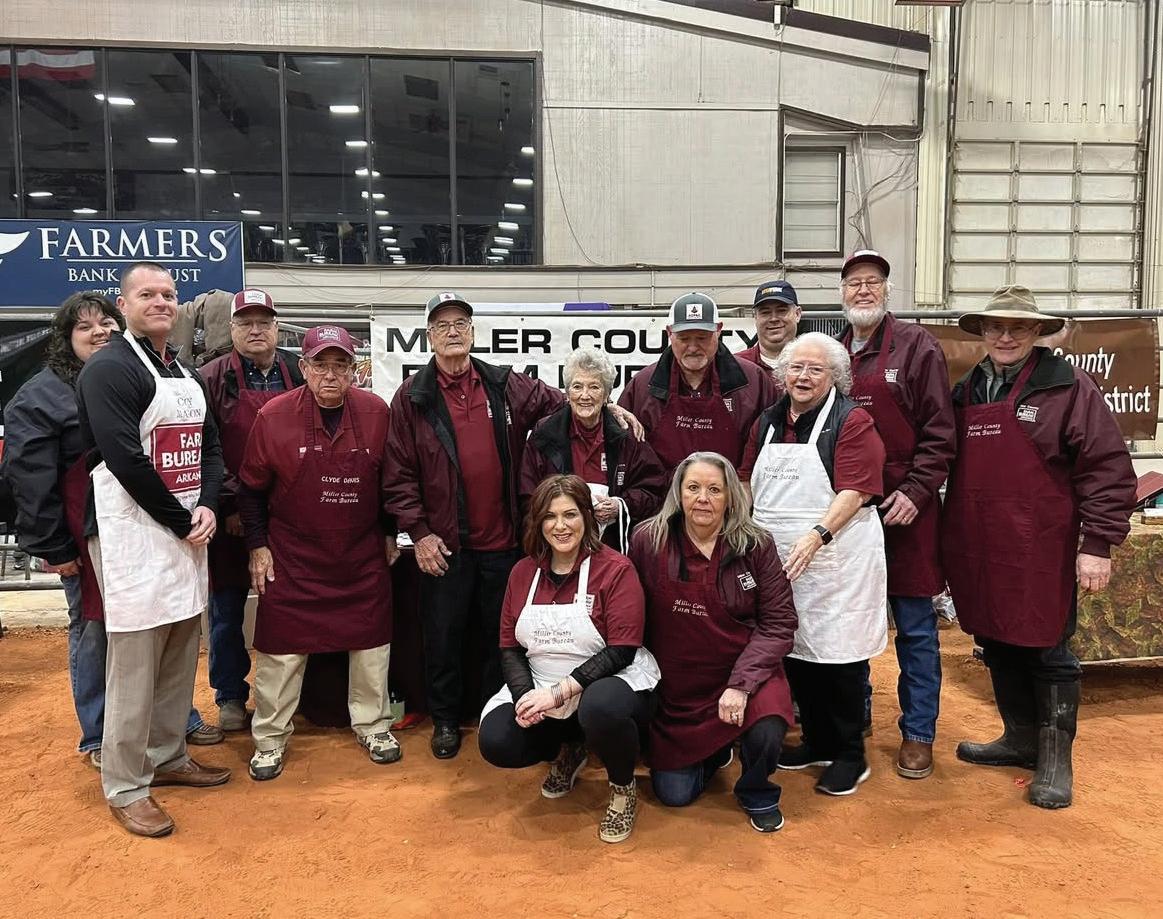
Miller County Farm Bureau recently sponsored a table at the Four States Agricultural Expo in Texarkana. The group also served burgers to attendees from Arkansas, Texas, Louisiana and Oklahoma.
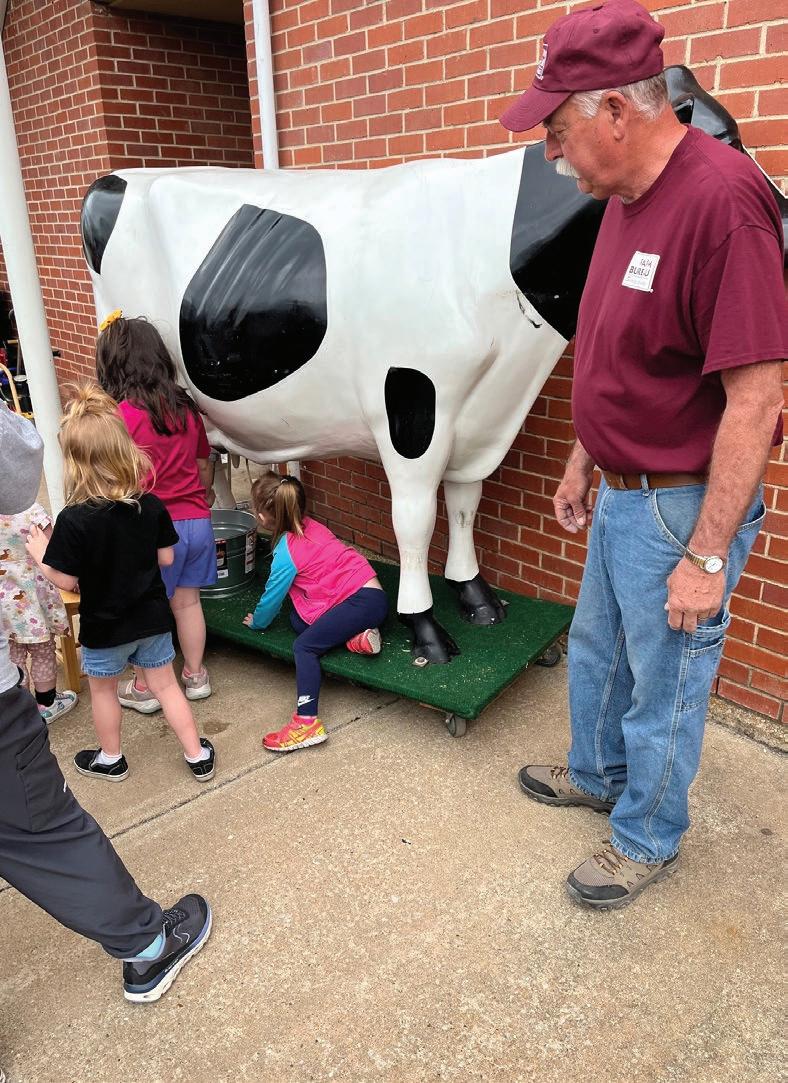

For the third year in a row, Franklin County Farm Bureau hosted a snack drive for the Franklin County elementary schools during Farm Bureau Week. A local Ford dealership provided a new truck, which was placed in front of the Ozark office to help spread the word all week long. During Farm Bureau Week, more than 7,000 individually wrapped snacks were collected for local students.

Excitement filled the air recently at Friendship Preschool in Marshall when “Elsie” rolled off the trailer. Once students realized “Elsie” wasn’t real and didn’t move, the milk flew and the petting began. Each student was held up to pet her nose and look her in the eye. After all the excitement, students planted some vegetable seeds and will get to watch them grow and harvest them. “Elsie’s” handlers for the day included Searcy County Farm Bureau President Randy Clark, board member Mike Crow and Women’s Leadership Committee member Jannie Crow.
During spring break, children of the Cross County Farm Bureau Women’s Leadership Committee and 4-H students volunteered at the Hickory Ridge Food Pantry. CCFB members volunteered to run and manage the food pantry and clothes closet while the students sorted clothes and household items, stocked shelves, boxed food, helped deliver to clients, cleaned inside and picked up limbs outside from recent storms.
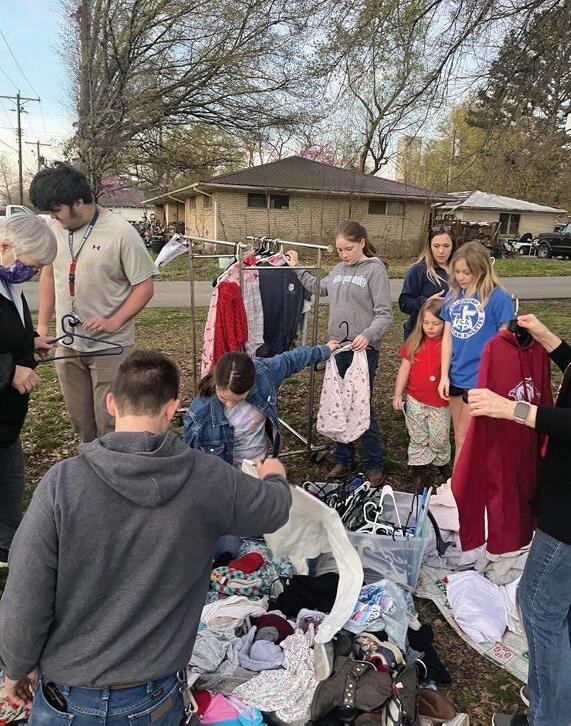
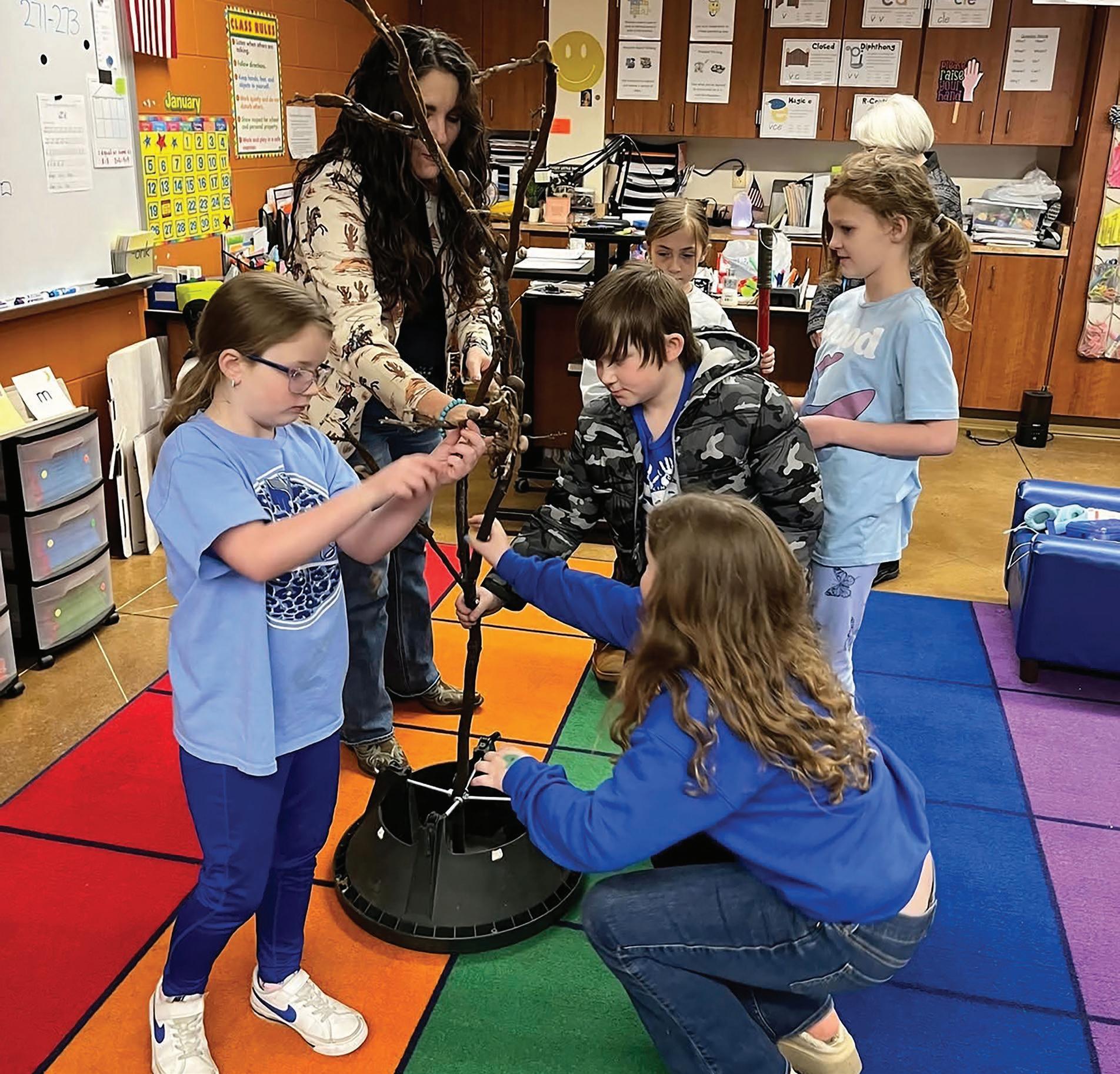
Stacy Witcher and the Cross County Farm Bureau Women’s Leadership Committee recently brought agriculture to local classrooms in a handson way. The group read “My Grandpa, My Tree and Me” to students and brought a branch full of pecans for students to shake and watch them fall. They also shared about the important crops grown in Cross County, helping students connect with the farming community.
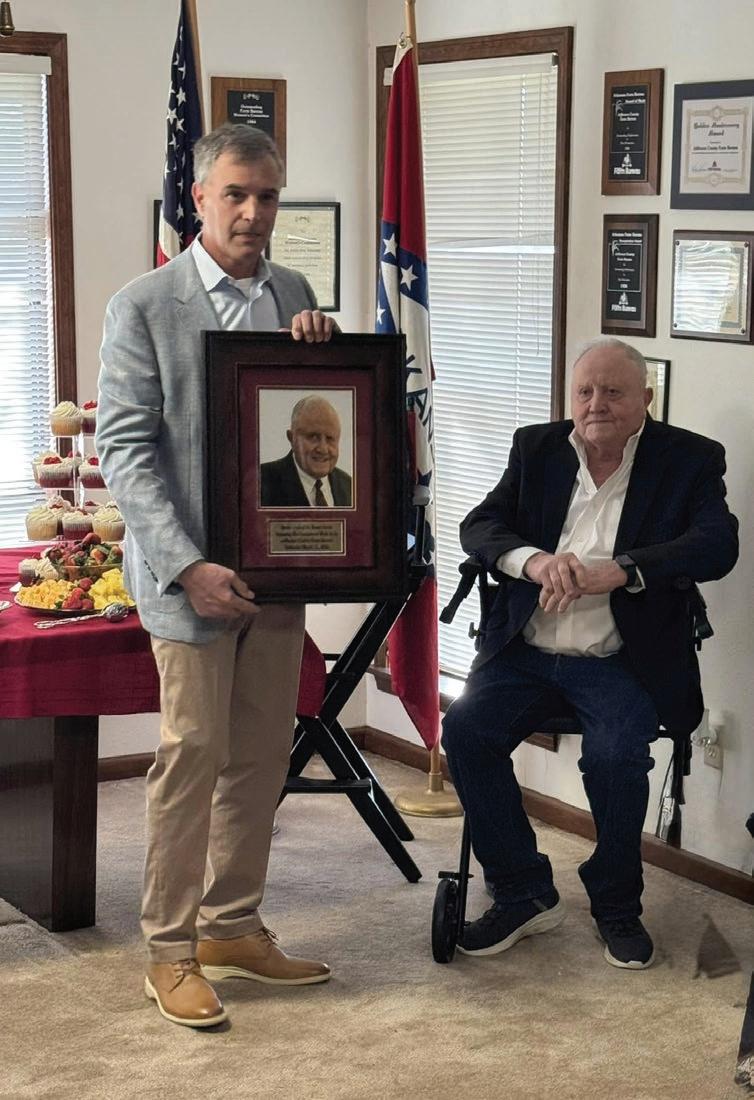
Jefferson County Farm Bureau recently honored Benny J. Fratesi, right, for 50-plus years as a board member and his commitment to agriculture with a reception and the naming of the board room in his honor. Jefferson County Farm Bureau President Bryan Bonds, left, presented the Benny J. Fratesi Board Room plaque to Benny for his work as a mentor, ag legislative advocate and membership promoter.
Saline County Farm Bureau recently hosted a food drive to collect much-needed food for the local food pantry. Students at the Harmony Grove Westbrook Elementary School also participated in the effort, with Mrs. Hollomon’s class collecting the most food and earning a pizza party. Pictured is the Saline County Farm Bureau board and its collection haul.

Mississippi County Farm Bureau board member Dino Pirani and his family donated $15,764 to the Rivercrest FFA. The donation represents the revenue generated from crops raised by the Pirani family from land surrounding the Rivercrest school district. It is the second year in a row the Pirani family has generously donated to benefit FFA members and promote agricultural education in the school district.


AgriCulture is not a podcast about raising crops or cows but how farmers navigate challenges and cultivate meaningful lives. They tell their stories, struggles and satisfactions from the farm in Arkansas.
The Arkansas AgCast is a weekly podcast discussing the latest news, trends and issues impacting Arkansas farmers and ranchers. Plus, occassional DeepDive episodes take the conversations further.

Finalists for two of Arkansas Farm Bureau’s Young Farmer and Rancher competitions have been announced. And the winners in each category will be named at the organization’s midsummer Officers and Leaders Conference on July 17-18 in Rogers. Both contests are designed to provide opportunities to give recognition for achievements in agriculture, business and leadership to young farmers and ranchers.
JOIN US at the Officers and Leaders Conference July 17-18 in Rogers to find out who wins the 2025 YF&R Excellence in Ag and Achievement awards.
VISIT ARFB.COM/EVENTS
The YF&R Achievement Award recognizes those who have excelled in their farming and ranching operations and exhibited outstanding leadership abilities. The award is designed for those involved in full-time production agriculture.

The Dilldines grow wheat, soybeans, cotton, corn and rice on 5,900 acres. Dalton is a fourth-generation farmer and Skiver is a registered nurse, and much of their quality time is spent together on the farm. When they aren’t farming, the Dilldines love to try new restaurants, travel and spend time with family at the lake. They are expecting their first child in June.

Clay and his wife Chalet have six broiler houses alongside a cowcalf and custom stocker calf operation. Clay also owns a custom litter and spreading business and grows hay for their livestock. They operate 450 acres in total, and when the Gustafsons are not busy farming they enjoy taking trips, spending time with family and friends and serving in their church. Clay and Chalet have one daughter and are expecting their family to grow this fall.

Jacob is a third-generation farmer of rice, soybeans and corn. Feather Farms operates on 1,450 acres and in 2018 the family diversified by adding pecan orchards to their operation. Jacob’s wife Callie is a local nurse practitioner, and they have three sons. The Feathers love to spend time with family, being outdoors and playing sports.
The YF&R Excellence in Ag contest recognizes the accomplishments of contestants who derive a majority of their income from efforts other than agriculture but are involved in farming.
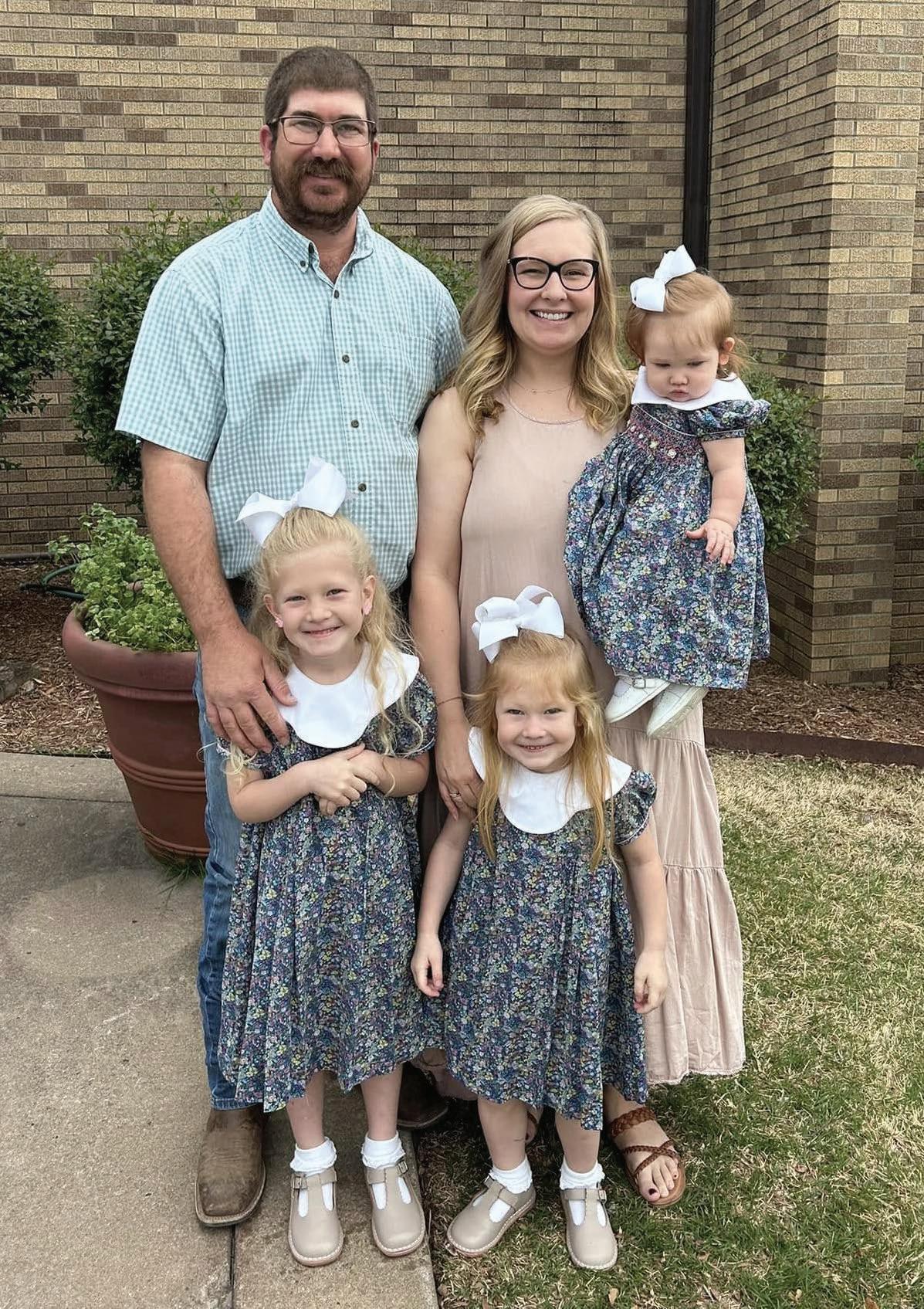
GARRETT AND MALLORY MOIX
The Moixes have a 300-acre Bermuda grass hay farm and a run a 130-head cow-calf operation. Garrett is immersed in the agriculture industry daily and Mallory works as a pediatric occupational therapist. They place an importance on improving and preparing for the next generation. Garrett enjoys collaborating with other local farms to ensure the success and continuation of farming in their area. They have three daughters and love to include their children in all their farming adventures.

The Kelleys have a commercial cow-calf operation in Conway, where Reed is an agriculture instructor and FFA adviser at Conway High School. Sarah is a labor and delivery and NICU nurse. Since starting their operation, the Kelleys now market sides of beef to the public and have a waitlist for beef in 2026. They have one daughter and one son, are active in multiple agriculture organizations and are passionate about serving others. They are active in their local church and through their operation they have been able to donate beef to the Triple S Christian Ranch for summer church camps.

Danielle is a first-generation farmer, and operates a cow-calf operation alongside her husband, Tye, and their daughter. Danielle works as a certified nursing assistant and also as a paraprofessional. The Rudolphs began farming with leased property and a small cattle herd. They purchased their current farm in 2023 and have been able to expand their herd. Most recently, Danielle purchased a small flock of hair sheep to diversify their operation and add to their regenerative agriculture program. The couple is actively involved in their county and state Farm Bureau, as well as their county fair board. They enjoy spending time together farming, playing sports and showing livestock.
more than 20 farms across the state and was created to help people discover the source of the food we consume. At each stop on the trail, you’ll meet farm families who grew the food you purchase and create lasting memories while traveling the state.
In this edition of Taste Arkansas, we have partnered with one of the farmers featured on the Arkansas Farm Trail, Sara Beth Johnson, who owns and operates Flying Pig Cattle Co. in Prairie County alongside her husband, Colton.
When asked to share a favorite recipe with us, Johnson quickly identified her mother’s homemade, farm-fresh, ice cream. Her mother, Susan Waller, grew up on her family’s dairy and fondly remembers summers with homemade ice cream, practically straight from the source.
Now, Johnson gets to continue to share that tradition with her daughter, Josey, who makes the third generation of women to milk livestock at the Flying Pig.
We hope you enjoy this sweet treat and make time to stop at an Arkansas Farm Trail farm or ranch near you this summer. Visit arfarmtrail.com to learn more or scan the QR code on the facing page.



Beth Johnson says her favorite thing about this recipe is that it’s delicious, and the ingredients don’t have to be heated, so you don’t have to temper your eggs. For a sweet variation, Johnson recommends adding a can of strawberry pie filling to your mixture and then topping your finished ice cream with farm fresh strawberries, which can also be found along the Arkansas Farm Trail.
Recipe for a 4-quart ice cream maker.
• 6 farm fresh eggs (which you can find at the Flying Pig)
• 1 ½ cups of sugar
• 2 teaspoons vanilla (more to taste)
• 1 gallon whole milk (Johnson recommends farm-fresh cow or goat milk, available at their farm.)
• Whisk together eggs and sugar.
• Add vanilla and a quart of milk and mix well.
• Adjust vanilla as desired.
• Pour mixture into ice cream maker and add milk to fill line.
• Mix ice cream according to the ice cream maker's instructions and enjoy!

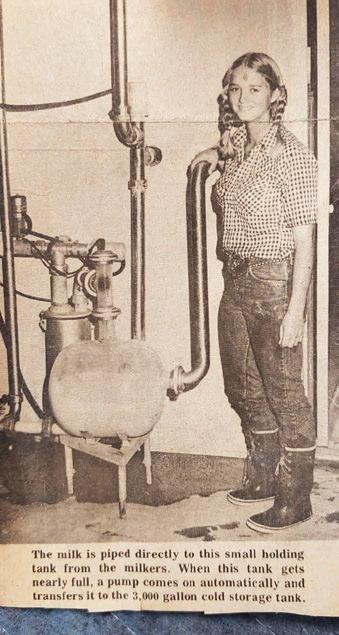


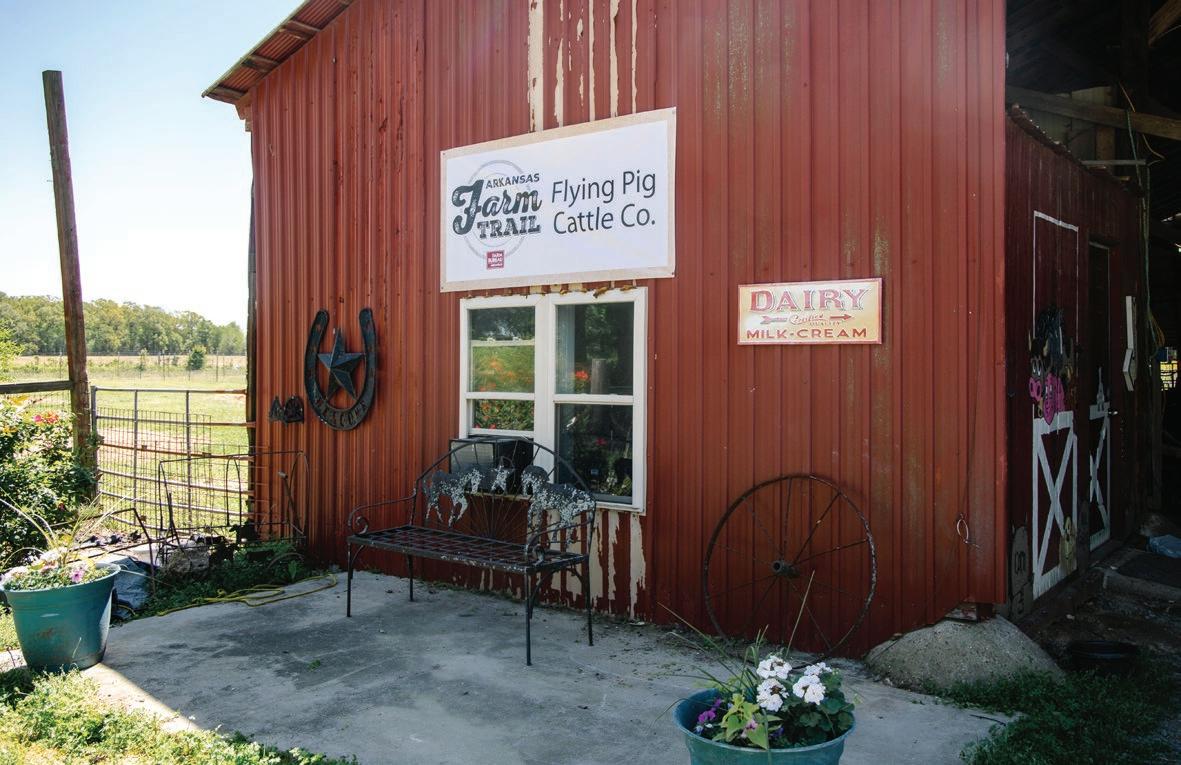

SCAN THE QR CODE TO FIND OUT MORE ABOUT THE ARKANSAS FARM TRAIL
To the top Women’s Leadership Committees of 2024. Thank you for all your hard work!
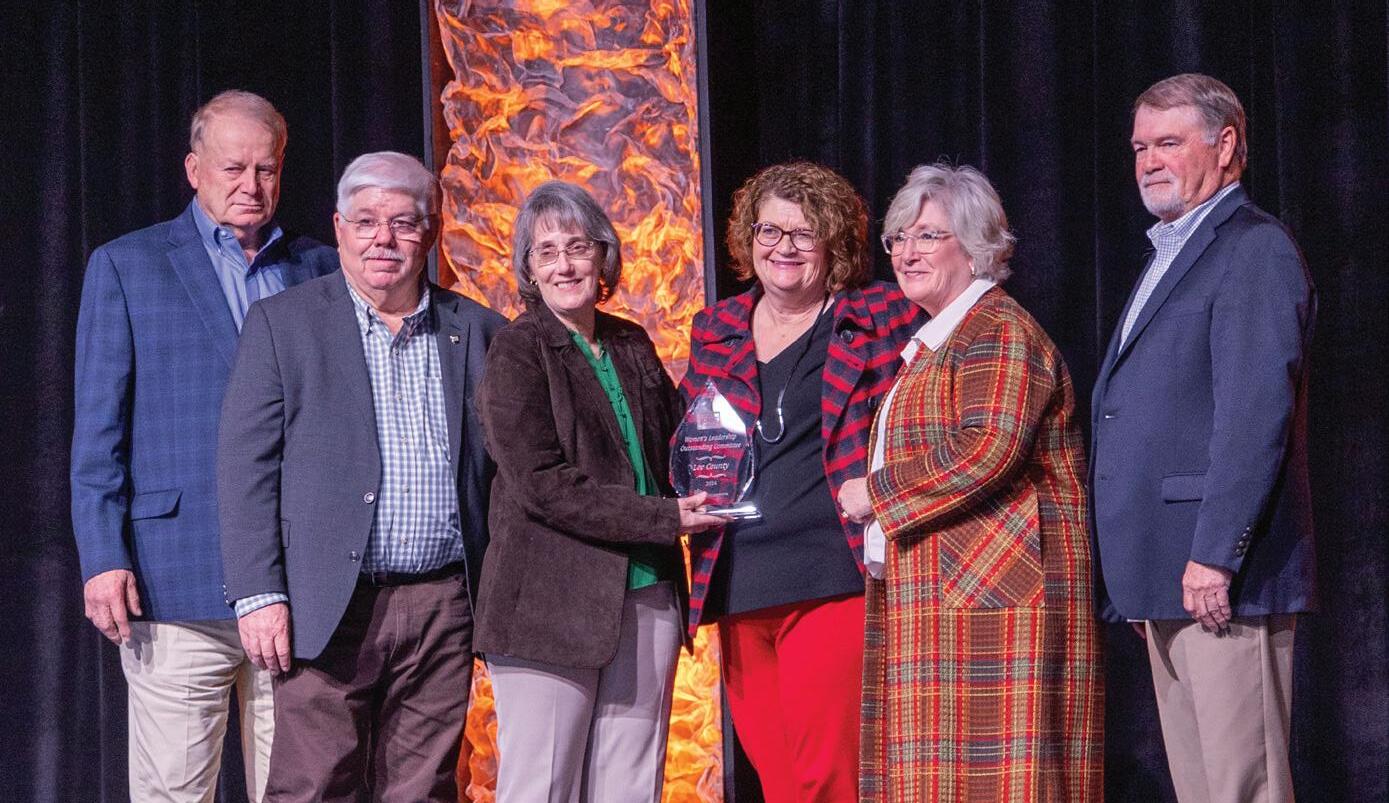
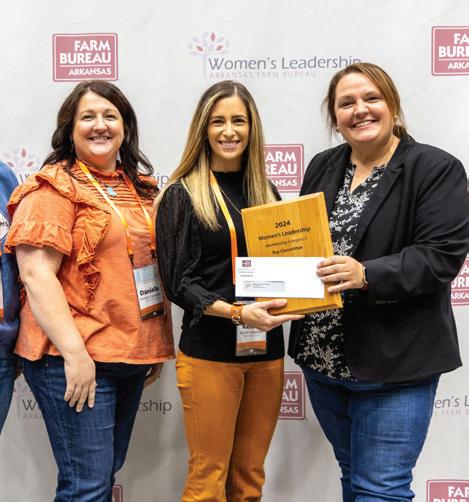



By TALYA TATE BOERNER
hen I was a little girl, being a mom someday was my No. 1 dream. I would have a career, too, like a nurse or a schoolteacher. Or maybe I would work at the Bank of Wilson in Keiser. The tellers who deposited the coins my sister and I rolled into paper sleeves always seemed unruffled and responsible, and I admired their spiffy attire. The map to my future lay as straight and steadfast as Interstate 55, only 2 miles from our farmhouse.
I began training for my crystal-clear future at an early age. My sister and I always received new matching baby dolls for Christmas. One year after we had been extra good, Uncle Rex gave us an entire kitchen for the playhouse Daddy built, and Santa (clearly in cahoots) brought us a doll crib. While Daddy farmed and Momma kept us fed and clothed, we cared for a playhouse filled with babies. Lash-rimmed eyes that opened and shut. Pink cheeks. Blonde curly hair. One particular Baby Alive doll even wet her diaper!
I loved those babies so much that I hated leaving them to go to school during the day. Sometimes, when I was supposed to listen to Mrs. Hilliard, I thought about my babies and hoped they were OK without me. What if they were crying? Or cold? Or hungry?
One afternoon, I was so determined to check on my babies that when I got off the school bus, I raced around the house and went straight to the playhouse. I fed and burped them, changed their diapers, and rocked them back to sleep, tucking them into their cradles for the night. When I finally went inside for my after-school snack (always peanut butter and Saltine crackers), Momma was frantic. She thought I’d never returned home from school, that I’d vanished into thin air, been abducted by aliens, or worse.
I couldn’t imagine why she was so distraught, but I admired her imagination.

Fast forward all these years, I realize there was never a time when I didn’t believe I would be a mom and a career woman. After all, I grew up during the 1970s when Helen Ready was roaring, and women’s lib was having a moment. Even television commercials promised a life filled with all the dreams. Enjoli Perfume introduced an eight-hour perfume for the 24-hour woman. Oh yes – I would bring home the bacon and fry it up in a pan, all while bouncing a rosycheeked baby on my hip. (Of course, this would happen after college and my eventual marriage to Donny Osmond.)
For the most part, my earliest dreams came true. I married (not Donny Osmond because, let’s be honest, the good Lord knows what we need) and had two perfect babies (a girl and a boy) while climbing the corporate banking ladder in Dallas. Of course, challenges were plentiful because real life likes to assert itself from time to time. And, I quickly discovered that bringing home even a few slices of bacon while juggling parental responsibilities required much more than a bottle of perfume.
Writer Gretchen Rubin (“The Happiness Project”) said, “The days are long, but the years are short.” Doesn’t that cut to the truth? Now, after retiring from banking to write books and grow a pollinator garden, my babies are grown and married, realizing their dreams.
And two months ago, the best thing ever happened: My baby girl had her very own baby boy!
There is such immense joy in seeing my daughter tending to her child and recalling the years she cradled and rocked her favorite doll (affectionately named Baby).
It’s undeniable, the circle of life sensation at play.
There’s nothing better than a healthy, sweet newborn with bright blue eyes and tiny fingers that wrap tight around mine. When he chirps and coos before falling into a peaceful milk sleep, the wider world seems infinitely more hopeful. And I wonder if being a grandparent isn’t the greatest dream of all.












